#just thinking about friendships on here
Explore tagged Tumblr posts
Text
piggybacking off mocha's post about mutuals & friends, if we are mutuals we are friends. chances are i already know your pen name and can easily identify you by url, pfp or ooc tags/combination of all three. you are not just a number or character to me. and i probably have already majorly thought about potential character dynamics & ships even if we haven't written together. you probably take up space in my brain! if we have been mutuals for a long time, pre-my hiatus, i probably thought about you that whole time !!
#✦ ooc. ╱ you know what comes with this great power.#just thinking about friendships on here#i love u mocha#dash comm.
17 notes
·
View notes
Text
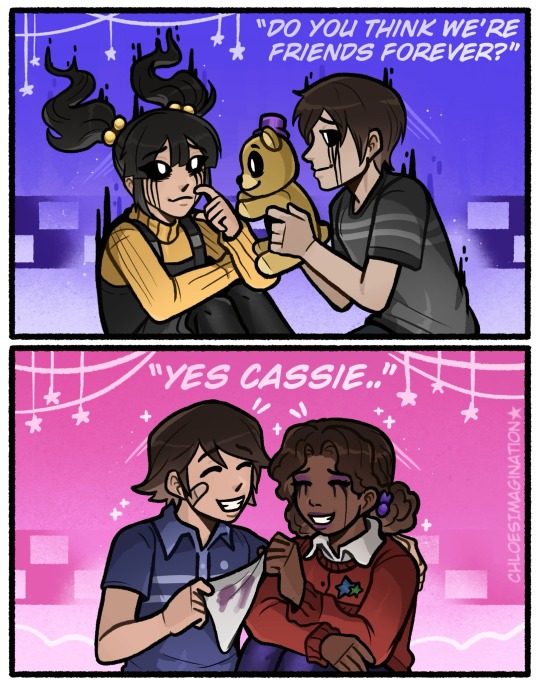
Friendship never dies in FNAF..
#myart#chloesimagination#comic#fnaf cassidy#evan afton#fnaf crying child#fredbear#fnaf gregory#fnaf cassie#fnaf#fnaf 4#security breach#fnaf ruin#fnaf fanart#five nights at freddy's#here’s your weekly angst guys 🩵 (more bittersweet)#I genuinely believe Cassie and Gregory are symbolic to Cassidy and cc#but anytime I think about that connection it makes me sob#not only destined to be friends in every new life#but they have a doomed friendship at that#I JUST want these guys to be happy and live normal lives 😭#begging and hoping Gregory and Cassie can have that happy ending..
7K notes
·
View notes
Text
Bad: I don’t think people understand the effect QSMP had on some of the streamers in terms of like… The real raw mental impact, so I’m gonna set the stage for you. [...] Imagine that you were given a friend to play Minecraft with — like your best friend — BUT if this person dies, if they die in the game, you never get to talk to them again. Can you imagine what that’s like?
Bad: If you did not live through the QSMP, if you did not live through that, it almost sounds like, crazy. But I don’t think people realize how much of a joyous experience the Eggs were. They were SO awesome! They were literally so awesome to just hang out with and spend time with.
Bad: I’m not saying I regret it. To this day, I loved the experience. I’d do it all over again in a heartbeat. Even knowing how everything went, I would still do it all over again. [...] I would still do it all over again, because — even knowing like, all the trauma and suffering and stuff like that — because it was just… It was just that fun, it was just that fun.

Earlier today during his stream, Bad shared his experience and thoughts about the Eggs and the significant emotional (and traumatic) impact they had on him and his fellow QSMP members.
This clip a very edited-down version since his commentary was ~13 minutes long, so I highly recommend checking out Bad's VOD if you have the time. (Timestamp: 47:36 - 1:00:14)
[ Full Transcript ↓ ]
———
Bad: To be fair Chat, I really think the QSMP... I don't think anyone really can relate to it, Chat. It's something that's so... I've told people this before, like– but it's hard to understand. Right? Like...
Where was I? Sorry Chat, I'm losing my train of thought. Look, let me explain Chat– here's the dealio, ok? Here's the dealio, and this is what I mean when I say like, it's important to keep this in mind, Chat. Ok? It's important to keep this in mind:
I don’t think people understand the effect that the QSMP had on like, some of the streamers, in terms of like… The real raw mental impact, so I’m gonna set the stage for you. This is the analogy I’ve given to every person who I’ve like, shared this with. Imagine you meet somebody– [He hears a strange noise] What the fudge was that? Did you hear that?
Anyway– Chip! The story I was just relaying to Chat, Chip, was this: I was sharing this story with them, I said– I was giving them an analogy.
Imagine Chat, for example, imagine that you were… playing Minecraft, with like– you were given a friend to play Minecraft with, Chat, like your best friend, and [unintelligible] were like, “Hey, you get to play Minecraft with this person, right? BUT if this person dies – they’re currently your best friend, Chip – but if they die in the game, you never get to talk to them again. Ever again.” Can you imagine what that’s like, Chip?
I don’t think a lot of people understand like, what that does, right? I’m not gonna say that like, it creates this situation, Chip, that like, messes with your head, but it– Chip – but it totally, totally does, Chip. It messes with your head! It literally puts you in a position where you’re second-guessing and thinking about everything, Chip! You’re thinking about EVERYTHING Chip! Ok? And that’s the problem, Chip– is you turn into a paranoid monster because of it, Chip! Like, you don’t understand Chip– I was- I was so afraid of every dirt block, I used to carry a shovel with me Chip, and I would specifically right-click dirt blocks that looked suspicious because mines, Chip– mines could not be shoveled! Like, I was crazy, Chip! But here’s the problem, Chip: that craziness is still there. I’m genuinely like–
I remember thinking Chip, that I would one day– I was like, “I’m going to move past–” here, let’s go up here, Chip. I remember thinking one day Chip, I was like, “I’m gonna move past the underground base, one of these days. You know, one of these days, I feel like I’ll be able to grow and achieve the desire to build a base that doesn’t have to be underground.” But I don’t think it’s possible now Chip, because I think… I just don’t know. I feel like the paranoia– there’s still like, residual leftover trauma from that situation, Chip.
But here’s the problem Chip: I don’t think I don’t think– I don’t think people understand it. Like, I just really don’t. But I also don’t blame them Chip, ‘cuz I don’t think it’s possible to fully understand it if you haven’t lived through it. Like, if you did not live through the QSMP… I’m talking about the QSMP, I don’t- I don’t know if that was obvious– if you did not live through that, it almost sounds like, crazy. But I don’t think people realize how much of a joyous experience like, the Eggs were. Right? I don’t think people realize it. Like, they were SO awesome! They were literally so awesome to just hang out with and spend time with, Chip. So, it’s just one of those things that–
[He’s interrupted by a loud rumble of thunder above them]
Did lightning just strike here? Is it thunderstorming out…? But anyway, Chip. That’s the food for thought.
But that’s the problem– Like, every time it rains in Minecraft, I have to like, look at the sky, and I get this weird, like, second--hand vibe because of the trauma. The trauma, Chip! The trauma is real! But that’s the point– I’m not saying I regret it. I, to this day Chip, I loved the experience. I’d do it all over again in a heartbeat. Even knowing how everything went, I would still do it all over again.
[He falls down] Dangit, don’t come over here Chip, ‘cuz I’m coming back up! Ok.
I would still do it all over again, because — even knowing like, all the trauma and suffering and stuff like that — because it was just… It was just that fun, Chip, it was just that fun. I really wi– I don’t think it’s ever gonna be possible, Chip, to give people that same energy, like that same experience. You know what I mean, Chip? I don’t think it’s ever gonna be possible again. Like, EVER.
Because… because like, one: I will say on one level Chip, I will say on one level, like– it’s sort of emotionally like… It’s emotionally devastating, and I think to actually go through that– and this is where like, if I ever do end up going to a– see a therapist, if I ever do end up going to see a therapist at any point, I’ll talk it over with them and be like, “Hey, what do you think about this?” Because I genuinely think on one level, like– it’s created this fear of forming attachments because of like, how things can go. You know what I mean? Like, the fear of getting attached to something and then potentially losing it. Like, it’s- it’s a genuine thing. I think people forget about that.
Like, at the end of the day, everything was RP, right? On the server. You know what I mean? Like, everything was RP, Chip. BUT at the same point, even though it was RP Chip, it was still like– there the reality of you were still playing like, with another person, and you were still getting that experience, and it felt like you were genuinely attached to someone and you didn’t want anything bad to happen to them. It was GENUINELY stressful, Chip.
But at the same point, I don’t regret it, and I don’t think it was a bad experience. I’m–
Sometimes in life Chip, you go through stuff, and maybe you have a certain amount of like, things that like, can happen, that you’re like, “You know what, maybe this wasn’t a good thing that this happened,” but at the same point, you still aren’t necessarily upset about it, because… it’s like growing as a person, right? Here’s the thing Chip; even bad situations, Chip, can lead to an overall good outcome. Like–
Even if you’re going through something bad Chip, just because a bad thing happens doesn’t mean that only bad things have to come from that. That’s one of the things I tell people all the time, Chip, is that if you go through a bad situation, you can learn from it, and you can use your experience to help others. And you can be that– you can be, at the worst-case scenario, you can be someone for other people who are going through that same experience to lean on when they go through that.I think there’s a certain amount of comfort that comes from that; from knowing no matter how bad your situation is, you’re not the only person who’s experienced it. You know what I mean?
#Badboyhalo#BBH#Bad#QSMP#January 8 2025#Edited#I know folks are going to add their two cents on this subject in the tags / comments / replies (and as always you're welcome to do that)#But for the sake of my sanity please don't be an asshole to any of the CCs / ex-admins / fellow fans / anyone else. Thanks#Most folks here don't need a ''Don't be a dumbass'' reminder but I had to block someone for that earlier and it was a bit disappointing#This is going to be a Tumblr exclusive clip because I don't trust Twitter to have common sense or common decency about this topic#Tumblr exclusive#Anyways business aside – that black line on the side is just part of Bad's stream btw. He just Has That#Took too long for this to render otherwise I'd edit it out because it's annoying#I'm just realizing this screenshot doesn't even have Dapper OTL but it's the best one I have so I gotta work with what I got#Honestly; I still miss QSMP dearly... I love the core intent of the project and the multicultural exchange#I love all the language barriers that were broken and I loved all the stories that were told and watching beautiful friendships bloom#But I am still so angry and disappointed about how things ended and all the poor communication and the admin situation as a whole#It's a complicated feeling#I agree with pretty much everything Bad says here#It's ironic that he uses that analogy because I've said almost the exact same thing when explaining why losing any Egg was so devastating#We weren't just mourning for the characters. We were mourning for the admins too#I'll never forget that last stream with Tazercraft and Richas; and Pac ending stream in tears#I wish they'd done away with the Egg life system. I wish they'd done a lot of things differently#If the project ever does come back in some shape or form I hope they are more transparent about things and have better communication#I dunno how I'd feel personally. They would have to do a lot of work regaining people's trust#And frankly I don't think they'll ever regain that trust from a large portion of the community#I remember near the start of QSMP I saw a comment from a fan that simply said ''QSMP; please don't leave me feeling bitter''#I think about that comment a lot
706 notes
·
View notes
Text
Actual Ultimate Classpecting Guide
For real this time.
Buckle up, this is a really long one. For everything that's posited, I can provide textual evidence; that being said, I'm not going to be including the textual evidence within the essay itself, because it's already long enough as-is. As such, please feel free to ask for clarification or sources on any assertion, and I'll do my best to provide.
Before we begin, there's some things to discuss about how we're going to be approaching classpect in the following essay. In numbered list form for our short attention spans:
1. There is a concept Hussie talks about multiple times in his book commentary, "personality alchemy" - the idea that there are these "platonic ideals" of certain characters, which can be mixed and matched with others, in order to create new characters. The examples he gives are of how Eridan was a proto-Caliborn, how Kanaya has shades of Jade, how Nepeta was a proto-Calliope, and how Sollux and Eridan have shades of Dave in them. Classpecting is fundamentally a form of this personality alchemy:
2. Class describes the character's arc and emotional hurdles, while Aspect describes the character's base personality traits by which this arc is experienced.
3. For example, all three Seers struggle with hubris: Rose's need to be the smartest person in the room led to her being manipulated by Doc Scratch, Terezi's obsession with meting justice led to her engineering a situation where the only option was to kill Vriska, and Kankri's desire to be seen as a spiritual leader amongst his friends led to him furthering their divisions and harming them.
Then, when their pride is shattered, they cope by inflicting willful self-blindness: Rose turns to drinking herself stupid (the opposite of Light's sway over knowledge), Terezi gets down with the clown (the opposite of meting out Mind's justice, as it's a Gamzee W), Kankri goes celibate (Blood L) despite his clear romantic feelings for certain teammates.
4. As for Aspect: note how all three Life players share the personality traits of optimism, stubbornness, and obstinacy. All three Breath players share an immaturity and naïvety, and are quite frankly irresistible to people for some reason. All three Light players share a need for the spotlight and a tendency toward long-windedness and persnicketiness. So on and so forth.
What's interesting is, if you start analyzing characters that share Classes and Aspects, these specific types of similarity crop up over and over - all our Knights struggle with insecurities and facades, both our Bards have a crisis of faith. All three Breath players have an aspect of immaturity and childishness to their characters, and all three Light players are deeply concerned with appearing intelligent and feeling important.
5. As a result, this guide is NOT intended for classpecting real life people, because we are complicated, we contain multitudes, and we don't have arcs. This is primarily an analysis of what Class and Aspect mean in Homestuck based on textual evidence, because I genuinely believe that you can basically figure it out if you read carefully.
6. Duality, and the idea of "equal and opposite," are major themes within Homestuck - Prospit and Derse, Skaia (described as a crucible of birth and creativity) and the Furthest Ring (the literal afterlife). Which classes are involved in an Active/Passive split, and opposing Aspects, are the same way. This is the primary method I used to determine the Active/Passive pairings and opposing Aspects. After all, as Callie describes, both Thieves and Rogues are classes "who steal" - so, too, do I try to unify Classes by a common theme, even if they diverge wildly in how that theme is expressed (as Thieves and Rogues do). In the same way as the opposite of "up" is not "apple," but "down", because "up" and "down" are both fundamentally concerned with relative vertical position, so too can be defined concepts like Breath and Blood, Hope and Rage, Light and Void - as well as the reasoning behind Class pairings like Heir and Page, Maid and Knight, and Seer and Mage.
7. Descriptions for both Class and Aspect are left deliberately vague and up to interpretation within the comic itself, and this is by design: the actual manifestations of an Aspect can vary wildly given the Class, and even individual person, that it's tied to. Calliope even makes note of the fact that, under the right circumstances, someone can manifest effects that appear to be the opposite of their aspect. She's also careful to couch her language in "may" and "can" - because these concepts are intentionally somewhat nebulous and malleable. As such, while this guide certainly lays down what can be gleaned and inferred from the text, do note that Homestuck runs on a soft magic system, and as such, nothing stated is firm, 100%, must-always-be-this-way - just an overview of what we've seen.
8. There is often great overlap between Aspects, Classes, and Classpects - which Calliope herself notes. Heart and Blood are one of the most salient, as they both have a fixation on relationships, and Calliope mentions that under the right circumstances, a Classpect may even be able to manifest what appears to be the opposite of their Aspect. Again, Homestuck operates on a soft magic system, so this is a feature, not a bug.
ASPECT
There's a little less to say about Aspect, not because it's less complicated, but because "base personality traits" are much more nebulous compared to Class's sway over character arc. Still, Aspect represents the fundamental way a character is, and thus, color every interaction that character has. There's a reason Ultimate Selfhood is sought through Aspect, not Class - Aspect is the core of the character's being, what makes that person that person.
That all being said, Class has major sway over how an Aspect manifests, and certain classes can even invert the Aspect and even the character's role in the party. As such, these descriptions must be parsed carefully in relation to Class. Moreover, due to the soft magic system, there is at times overlap between unrelated Aspects, which can also be exacerbated by Class - Heart and Blood being the most obvious in this regard. Still, overall, you'll find the Aspects to be fairly distinct from one another.
Please also note that every Aspect can deal with its literal counterpart by default - Light players can wield lasers, Breath players can wield the breeze, et cetera. Because this kind of goes without saying, and because the non-literal stuff is more interesting to discuss, I'm not really going to go into too much detail about the literal qualities.
Finally, something interesting to note is that nearly every Aspect follows its own Hero's Journey cycle - full actualization for each one usually means reaching around to its opposite Aspect, and taking lessons from them - for example, Breath players need to learn maturity and responsibility, while Blood players need to learn relaxation and whimsy. Thus, an Aspect at its worst manifests in two ways - either a toxic overabundance of the Aspect's worst traits, or such a dearth of the aspect that it begins to resemble its opposite. Only by reaching into the opposite, however, can the player be tempered and reach full maturity - can they become more of who they are.
SPACE / TIME
Space and Time are both concerned with physical reality, goals, and the way one approaches them.
Space is associated with "the big picture" - with recycling, reproduction, and the interconnectivity of all things. The aspect also presides over the enjoyment of the journey over the destination - Space players serve as reminders that the present moment is as important as the end goal. Space is often a more passive Aspect, being the stage upon which the story is set. They're the hosts of the party, and the one who marks the ending.
Its players reflect these tendencies, often being feminine, with penchants for life-giving acts such as gardening. Their personalities tend towards frivolity and silliness, finding it difficult to stay on-topic or bring full gravitas to serious situations. Perhaps a better word would be "distractable;" when the aspect is so concerned with all things in connection with each other, it's easy to lose track of details, and it's easy to enjoy things simply as they come. Space players tend to be kind, patient, and forgiving, which is a strength as much as it is a flaw; it's easy for malicious actors to take advantage of this compassion, or for the Space player to find themselves in a poor situation by being overly permissive. They can easily be painted over by stronger personalities, and tend to struggle with romantic relationships, as they attract many with their kind and giving natures, and few are naturally so considerate of the Space player in turn.
"Passive" is a good word to use; at a toxic overabundance of their Aspect, Space players are trampled underfoot. They become enablers, servants to dark forces, or so lost in their own worlds that they neglect the one they live in. With their Aspect "inverted," a Space player becomes a demon of poor prioritization. Distracting not just themselves from their true purpose, but others, too, the Space player will wreak havoc by overemphasizing unimportant topics and ignoring important tasks. This superficially resembles Time, in that the Space player will become fanatically dedicated to their task, but note that the poor prioritization is still Space-esque at its core.
Still, within this nadir is a valuable lesson: the strength of self-assertion, and the determination to see a goal through. These will allow the Space player to weed their garden, separating good from bad, allowing it to flourish like never before.
Time, in contrast, is associated with "the little things" - with details, minutiae, and processes. Time presides over the struggle toward something greater, the endurance of hardship with an eye on the prize - the destination over the journey. Time players are the ones keeping track of the tasklist, marking off each item as it reaches completion; they are the tireless workers keeping the whole engine running.
Time players, thus, are ones whose lives are marked by struggle. They are highly goal-oriented; in contrast to how Space players can easily move from goal to goal, task to task, Time players feel bound to see things through to the end, finding satisfaction only when they've achieved their desired result - and only until they come across the next goal in their journey. A Time player isn't happy without a goal to work towards, a craft to polish, a prize to win - but this driven nature can easily be its own downfall, as it leaves little room for the player to admit to their own shortcomings, or ask for help from others. Moreover, their focus on minutiae can leave them blinded to the bigger picture, and it's easy for a time player to fall to despair, able to do nothing more but spin their wheels. They're prone to directionless anguish, frustration, and resentment towards the seeming futility of their actions, becoming destructive and defiant even when it doesn't serve them to do so.
At a toxic overabundance of their Aspect, Time players become explosively destructive. The ultimate "goal" of all things is death, with which Time is associated, and accordingly, Time players have a penchant for aligning themselves with futility and entropy, struggling so hard that their thrashing leaves a trail of annihilation in their wake. With their Aspect "inverted," Time players detach entirely - they can become so fed up with struggle that they simply opt to lay their weapons down and let the end take them. It's very easy for them to come to the conclusions that either everything matters, or nothing matters. This superficially resembles Space and its big picture thinking, but note that its framework of struggle, and whether or not a goal needs to be pursued, makes it a Time concern.
But the inherent meaninglessness of existence is, in itself, an important realization to make - that whether or not anything "matters" in the grand scheme, things can still be worth doing, worth caring about, and worth investing in. This realization allows the Time player to attack their goals with renewed vigor and greater clarity, which in turn means that the party becomes an efficient, well-oiled machine.
BREATH / BLOOD
Breath and Blood are both concerned with directionality, interpersonal relationships, and autonomy.
Breath is the Aspect governing freedom, liberty, and independence; it is a force that breaks shackles, clears out social norms, and refutes "the rules," whatever those rules may be. Breath players can't be tied down, whether by physical bonds, societal rules, or even the ineffable forces of the narrative itself. They are leaders of example, pioneers, and trailblazers, opening new paths for their teammates to follow.
Breath players are goofy and gullible, often with hearts full of childlike whimsy, naivety, and even immaturity. They are friendly and well-meaning, fond of simpler things, and easily swayed by others. They approach the world with a sincere and innocent good-naturedness, like a baby animal before it learns to be fearful of danger. Something about this sincerity seems to make Breath players irresistible to others, and they often find themselves the subject of romantic attraction. However, in this childishness is also the great pitfall of many Breath players - their natures are naturally conflict-averse, and egotistical the way a child can be, failing to see beyond themselves. They can be incredibly callous when not considering the consequences of their actions, or the viewpoints of others.
At their worst, Breath players are irresponsible and callous. They'll shirk the consequences of their actions, blaming anybody but themselves, or simply choose not to care who they hurt in order to get what they want. They may even choose to stop making choices for themselves, leading to the "inversion" of their Aspect - a voluntary loss of freedom and independence, derived from an Breath-like aversion to responsibility, which superficially resembles the bondage of Blood.
But if they are able to overcome these tendencies, a Breath player will learn what true responsibility looks like - responsibility for themselves, their choices, and the effect they have on others. Armed with this, a Breath player's ability to break bonds can be focused into a clear force for good, clearing away all obstacles and harmful societal standards, leading the charge into something new and beautiful.
Blood, in sharp contrast, is the aspect that governs bondage, contracts, and interdependence. It is a force that binds. Under Blood's sway are not only romantic entanglements, but familial, friendly, and societal ones as well. This aspect sees overlap with Heart, but the division is this: Heart concerns itself with feelings, and Blood concerns itself with compatibility. Blood players are diplomats, forces that remind us all that we are more similar than we are different, and that that similarity should bring us together when we are on the verge of pulling apart.
Blood players, reflective of their Aspect's association with bonds, tend to be neurotic and obsessive. They have a tendency to over-examine and overthink, constantly fretting over the infinite and infinitesimal variables that influence the shape of society and interpersonal relationships. However, this judgmental nature stems from a deep well of idealism and empathy; Blood players can't help but care about others and wish for the best for them. In a way, this makes them one of the most mature members of the team, being concerned with its overall well-being. Unfortunately, their prowess does not extend inwards, and their assessment of themselves is usually direly incorrect - all the worse because Blood players always feel responsible for those around them. Blood, being the Aspect concerned with interdependence, is the weakest one when all alone.
Thus, it's easy for the Blood player to wind up controlling - desperate to make sure everyone is moving according to their vision, they'll become iron-fisted dictators, with a "my way or the highway" approach to social interactions. It's easy for them to wind up pariahs of their own making, becoming so critical of others, or so adamant about enforcing their own will, that they inadvertantly sever their ties - something that superficially resembles Breath's independence, but is truly a result of Blood's neuroticism.
But with that space and separation can come great clarity. Blood players must learn to relax their grip, and allow people room to breathe - including themselves. Once able to grasp that sometimes bonds must be forged with a soft touch, Blood players' natural empathy shines through, allowing them to build something so much kinder and greater than the sum of its parts.
LIGHT / VOID
Light and Void are both concerned with knowledge, ontology, and "narrative relevance".
Light (as well as its counterpart) are perhaps best understood through the lens of "narrative" - this idea that, of all things that do and don't exist, and all events that do and don't happen, only the ones put to page are "relevant". Thus, Light is associated with knowledge and luck - that is to say, it's associated with the knowable, the objective, and the concrete, and the ability to determine "important" events. Light players have read the book they're participating in, and able to serve as luminary guides from one plot point to another, lighting the lampposts for others to follow.
Light players, naturally, are erudite and educated, possessing keen intellects and cunning minds. They are fond of knowledge itself, of markers of status and prestige - whether that's wealth, the adulation of the masses, or a massive library. They harbor a desire to be important, to be seen, to be acknowledged, and are happiest when they are looked up to. Conversely, they deal poorly with being looked down upon. Their confidence transmutes easily into hubris, and they struggle with having that pride challenged. As such, they tend to be volatile and unpredictable, quick to retaliate against those who threaten their egos, or obsequious to those whose acknowledgement they desire.
Their desire for the limelight can quickly spell disaster - they can become incredibly cruel, harsh, and egotistical in their pursuit of narrative significance. They forget, in their obsession, that they, too, are fallible and flawed, and the inevitable reminder can come very harshly. Light players struggle with moderation, and as such, when they feel shame, they'll often take drastic measures to cope with it - deliberately darkening their own influence or intellects, removing themselves from the "story" entirely - something which superficially resembles Void's penchant for the background, but which is firmly rooted in Light's obsessive need for drama.
But in experimenting with narrative insignificance, Light players can reach an epiphany - in their absence, others may shine, and that can be a wonderful thing. Light players, then, can learn to shine not just for their own sakes, but for the sake of others, allowing them to weave a story even more brilliant than any that can be weaved alone.
Void, in contrast, is the blank spaces between the words. That which is secret, subjective, unknowable - these are Void's domain. It's associated with taboos and hidden things, sexuality and pleasure. It's also associated with the empty canvas - the blank space before creation, and the oblivion to which creation is eventually destined for. Thus, it stands for infinite possibility, though the collapse of those possibilities into a reality removes that reality from Void's domain.
Thus are Void players ever cosigned to the background, though this generally suits them fine. Void players are very self-possessed. Where Light players tend to exaggerate and complicate, Void players are honest and simple, preferring straightforward solutions. They don't tend to think very hard, instead letting intuition and emotion guide them to where they want to be - which makes them one of the more stable personalities on a team. However, this simplistic, feelings-driven approach often leads to pleasure-seeking behavior, poor impulse control, and overindulgence in vice, and from there, to irrelevance, with which Void is so closely interlinked.
Void players are especially prone to vice, and at their worst, will become so drunk on pleasurable activities that they pursue them to the active detriment of the party's goals or the Void player's self-improvement - making them the ultimate irrelevant character. They can also very easily drag others into their mélange, with a forcefulness that resembles Light's illuminating guidance, but which is ultimately rooted in Void's pursuit of personal pleasure.
But there's a lesson to be learned in Light's domain: how to bring themselves into relevance and greatness. A Void player, once they learn to pursue not just personal pleasure, but a greater satisfaction for the collective whole, can drag the Void behind them, kicking and screaming, to where it'll be of use.
MIND / HEART
Mind and Heart are concerned with what it means to be a sentient being, with identity, and with why we do what we do.
Mind is the Aspect associated with logic, rationality, karma, ethics, and justice. To a Mind player, they "are" because they "think". They are keenly aware of the consequences of every action, and well-versed in cognition and behavior, such to the point of manipulating others with ease. Deeply concerned with the "effect" of cause-and-effect, Mind players are always cognizant of debts and credits, where justice is owed and where it has been over-meted, and their subtle machinations culminate, like well-placed dominoes, in grand and explosive finales.
Mind players are schemers - it's in their nature. They have a tendency to view the world as a puzzle or game, with themselves and the people around them as pieces on a board, and set as their standard rules the laws of ethics and karma - owed debts and overhanging credit - guilty and innocent. Mind players are wickedly cunning, and have an high success rate with every scheme they commit themselves to, but the grand downfall of all these tendencies is that they tend to lack in a sense of identity, and have a poor grasp on their own emotions or desires. While they may know how to provoke a desired reaction, they don't know how to change someone's mind. They often find themselves grappling very painfully with their own selfhood, with feelings of emptiness, inadequacy, or uncertainty.
Thus, a Mind player at the worst zenith of their Aspect is heartless and cruel. Leaving no space for empathy or even personal feelings in their plans, the Mind player will plot for an ending as heartless as they are. But a Mind player is never truly without emotion, and ignoring their own feelings causes them to manifest in terrible ways - Mind players have a tendency to seek toxic, codependent relationships, hoping to find external validation, subjecting themselves to the wishes of others, which can appear like Heart's fixation on feelings and desire.
But in recognizing their own need for emotional validation, and the importance of their own feelings, a Mind player can realize that there's an entire dimension to the game they've been playing that they've been ignorant of. When a Mind player learns to temper their schemes with empathy, compassion, and kindness, how much more success they'll see - and how much happier that grand finale will be!
Heart, then, is associated with feelings, motivations, intuition, the soul, and the self. To a Heart player, they "are" because they "feel" like they are - and they're keenly aware of the multitudes that are contained within themselves. Deeply concerned with the "cause" of cause-and-effect, they're drawn to desires, those of themselves and of others, especially where strong feelings are concerned. Heart players are gifted with an intuitive understanding of those around them, both their good and bad qualities, and are tasked with the grand task of bringing out the best.
It stands to reason, then, that Heart players have a firm grasp on who they are and what they want. For the same reasons, it's difficult for a Heart player to truly hate or condemn another person, because they are so adept at understanding them. However, this understanding comes with a price - because the Heart player is so aware of themselves, they can't escape their own worst traits - nobody self-loathes as accurately as a Heart player can. Nor can they ever truly be untruthful with another, making them poor manipulators. Capable of presenting a different facet of themselves as the situation calls for it, certainly, but just as it's impossible to lie to a Heart player, who always knows how someone really feels, it's impossible for a Heart player to lie to themselves.
With this sincerity comes vulnerability. Heart players wear theirs on their sleeves, and at their worst, this can make them demanding, needy, and sensitive - so eager to connect with others emotionally that they'll cramp themselves to fit others' desires. But they can't ever keep this up for long; Heart players have a tendency to withdraw from others after being hurt too often, finding it easier to be alone and silent about their feelings than to deal with the pain of rejection. They may even work to manipulate others, preying on their emotions and desires to force them to act in their worst interests. This superficially resembles Mind's cold logic, but unlike Mind's cool rationality, Heart's aloofness is a mask, an attempt to avoid pain by pulling away.
But this isn't purely a negative, because a Heart player can learn a healthier form of detachment, and separate out healthy and helpful desires from harmful and detrimental ones. Given this clarity, the Heart player becomes the team's emotional core, able to raise up each teammate's best qualities, while helping them deal with their worst, enabling everyone to be the best possible version of themselves - which the Heart player knew them to be all along.
LIFE / DOOM
Life and Doom are concerned with outlook, with journeys, and with trials and tribulations.
Life is an aspect concerned with healing, growing, and improving. It is associated with beginnings, optimism, and positive emotions. The very essence of Life lies in its healing abilities, in this idea of overcoming the odds and triumphing over hardship and difficulty. Life is action, movement, and motion, and its players can scarcely hold still. Life will find a way - and Life players harbor the same immutable belief; they are the most stubborn weeds in the garden, the cockroach that survives the apocalypse, and the beating heart that refuses to stop.
Life players tend to be optimistic and confident. They are self-assured individuals, with a stubborn belief that good things are on their way, and any hardship they face is not only temporary, but something that can be overcome. They can find the silver lining in any cloud, and enjoy themselves under any circumstance. They love to nurture, to care for others, though this love has a tendency to be one-sided. Indeed, Life's stubborn nature is its players' greatest pitfall; their persistence easily becomes obstinacy, and their confidence can become condescension. Their self-assured nature easily becomes egotism, and they can have great difficulty grappling with those who don't share their views - even coming to oppose those who bring emotional pain and suffering that can't be easily fixed.
It's very easy for a Life player to decide another person isn't worth their attention, and opt to leave them behind - after all, Life has to move forward, no matter what it tramples in the process. At their worst, they're stubborn to the point of not listening to anyone but themselves, confidence becoming blockheadedness. This focus on forward progress without looking back can even cause Life players to become harmful to others, so focused they are on their own growth that they don't notice that they're choking everyone else out. This may resemble Doom's death in its worst case - arresting everything else, eventually blocking even their own path with unruly, out-of-control fecundity.
Thus, a Life player needs to learn to more gracefully accept Doom's influence - to pause, slow down, and consider viewpoints that are negative, unpleasant, or difficult. A Life player, endowed with moderation, will be able to cultivate a bountiful garden, rather than an unruly jungle - a place for all to flourish and live in plenty, never wanting for anything.
Doom, then, is the aspect concerned with death, with rest, and with endings. Doom is associated with suffering and with negative emotions, with peace, with sleep, and with dreams. Doom players have a natural penchant for prophecy, and are often dual dreamers, able to take advantage of both Skaia's oracular clouds and the Horrorterrors' voices over Derse. All things must eventually come to an end, and not all times will be good; in these troubling times, Doom players shine, as they are the guides who call the murk home, and know best how to navigate rough waters, course-correcting until the storm passes.
Doom players tend to be deeply pessimistic. They experience, to a much more magnified degree than others, negative feelings and impulses, and it's difficult for them to see the world without seeing its flaws, first and foremost. They are not healers, but commiserators, those who understand greatest that sometimes there's no way to deal with tragedy but to simply sit with it and wait for it to pass. The counterpoint to Life's insistence on breathless positivity, Doom is a reminder that pain, grief, sadness, shame, and guilt are not unnecessary things - in fact, excising them can lead to terrible consequences. Doom players are the universe's martyrs, often taking it upon themselves to course-correct, to sacrifice themselves in order to give others a chance to continue on, to avert a terrible fate.
Unfortunately, this tendency also brings with it a tendency for Doom players to wallow in misfortune, or worse, to take themselves out of the picture, giving up entirely on seeing a better ending. As if energized by their own sense of futility, a Doom player at the "inverse" of their aspect may seem to echo a Life player's focus on forward progress and motion, actively spurring their team on towards an untimely demise.
A Doom player must learn to harness this sense of progress for good, rather than harm. A Doom player, once able to grasp the joy of life even in the greatest depths of despair, will be able to fill even the darkest hours with peace, meaning, and hope.
HOPE / RAGE
Hope and Rage are concerned with permission, and are the lens by which we define reality.
Hope is described by Hussie in the book commentary as being "framed as the most powerful aspect" because it is, literally, an aspect that defines reality. Its specific ability is lies in reducing the "fakeness attribute" of something, thus making it "real". Hope is associated with convictions, with idealism, with faith, order, holiness, and, of course, with magic - which Hope turns real. Hope is permission itself - a reality-breaking ability to look at the world and decree that it must be another way, a way in which the Hope player believes it ought to be.
Thus, Hope players tend to be hard-headed zealots, with no self-awareness whatsoever. Their inclination towards powerful beliefs makes them very difficult to dissuade from a path they've set their minds to, and their specific suite of abilities makes them terrifyingly likely to make their vision come true. Hope players are usually not particularly cunning, nor particularly intelligent, nor even particularly empathetic. Given the Aspect's focus on conviction and faith, it's usually very difficult for Hope players to notice anything occurring beyond their own minds and feelings. Thus are Hope players hopeless optimists, hopeless romantics, and hopeless in general - often great sources of embarrassment to their teams, as their naked sincerity is painful to witness. However, their ability to define reality does not leave them when their beliefs are faulty (which they often are, given Hope players are not particularly introspective, either), which is what makes a Hope player so dangerous.
A Hope player can easily be set on the wrong path - as convicted as they are, and as difficult to shake from that conviction as they can be, Hope players can easily march down a path of destruction, if not persuaded with a deft touch and gentle guidance. In the event that their faith is broken, Hope players easily become despondent and lost, floundering and wishy-washy, which superficially resembles Rage's self-consciousness, but is truly just a lack of direction.
But Rage has a powerful lesson to teach Hope players - that of questioning themselves, interrogating their own beliefs. Once their convictions have gone through rigorous scrutiny, revised into the best, brightest versions of themselves they can be, a Hope player is a worker of miracles - speaking into existence a beautiful future on faith alone, proclaiming that how they see the world is how the world shall be.
Rage, then, is the power of denial. If Hope reduces the "fakness" of a thing, then Rage reduces its "realness". Rage, too, is a means of defining reality, in this case taking a torch to the aspects of reality that it rejects. In more passive Classes, this works in subtler ways, stoking others towards destructive fury. Rage is associated with anarchy, chaos, revolution, destruction, anger, and nihilism. A Rage player will not suffer a world that does not satisfy them, breaking it to pieces, such that something new can take its place.
Therefore, Rage players are prone to harboring anger and resentment, discontentment with the status quo, and faith only in that what currently exists must somehow be dismantled. However, unlike Hope players, who can't help but be pathetically sincere, Rage players are incredibly self-conscious, and often try to mask and hide their embitterment and anger. This, ironically, leads to further ostracization, as others can tell they're being inauthentic. This only further compounds their sense of alienation, and drives them further into smoldering resentment. This makes Rage players sound volatile and dangerous, and they are - but the same fury that moves them is the fury that ignites revolts and tears down oppressive regimes, a necessary and vital well of energy and momentum. It takes careful handling to ensure that the team's Rage player can channel this energy towards righteous causes, rather than marking all as a target for their destructive ire.
In the worst-case scenario, the Rage player turns that rage out indiscriminately, deciding that there is nothing worth fighting for - only unpleasant things to be brought to ruin. This is Rage at its toxic overabundance. Conversely, a Rage player can retreat so harshly into their mask that they allow others to dictate their beliefs, taking them to heart - an action motivated by Rage's destruction (this time, turned inwards) that superficially resembles Hope's convictions and faith.
The true path for a Rage player is a healthy balance - to allow themselves some of Hope's sincerity, and by doing so, to become more sincere and true. This will let them release the pressure of their mounting ire, such that it can be converted into productive, rather than destructive, energy - the heralds of a revolution, razing away the faulty, corrupt old systems such that something better and new can take their place.
CLASS
As previously stated, Class governs a character's character arc - the character's starting circumstances, whether their conflict is primarily internal or external, and what major aspect of their Aspect becomes a hurdle for them to overcome.
In the same way an Aspect's sways tie into the character's base personality, the character's Class abilities tie into the kinds of struggles they face, and have great influence on how their Aspects manifest.
That being said, a character - and their Class - are always subject to their Aspect, as their Aspect is tied fundamentally into who they are. Thus, it can be said that a Light player will always have an affinity for knowledge and provide Seer-esque guidance even when not in a Seer role, a Doom player will always have prophetic abilities even with a non-prophetic class (note that Mituna, an Heir, still had prophetic visions, despite those generally being the realm of Mages and Seers), and a Life player will always have a penchant for healing, even paired with a destructive Class like Prince or Thief (the Condesce, after all, could still extend life; a Prince of Life would likely manifest not as one who causes plants to wither and die (this would actually suit a Prince of Doom), but one who destroys in the way of nature overtaking an abandoned shack, or a forest breaking down a body).
This means that when a character's Classpect inverts their Aspect, it doesn't mean that they suddenly become a hero of the opposing Aspect - rather, it means that, at their very worst - at the nadirs of their character arcs - they will lean so much into their Aspect's worst traits that it will superficially appear as the opposite, when all it really is is an absence of themselves. Dave, a Time player, usually so attentive to detail (despite his disaffected facade, he's always paying rapt attention to Karkat's rants, and noticing all the clues pointing to his destiny of defeating LE), at his lowest emotional point (arguing with Grimbark Jade after sobbing about his lost childhood whimsy), states that he doesn't think Lord English is that big a deal, and never even did anything directly bad to him or his friends - when he was literally directly haunted by LE via Cal his entire childhood. Similarly, Rose drinks herself stupid in order to cope with her mother's death.
Note how, superficially, this almost appears to be an invocation of Space's "big picture thinking," its passivity and permissibility, or how Rose's case appears to be Void's tendency to indulge in vices and pleasure - but they're not. Time's worst traits superficially resemble Space, Light's resemble Void, and vice versa - Grimbark Jade is the Condesce's taskmaster, and Porrim at her worst was as much of a nag as Kankri, trying to do a Time player's managerial job. Horuss and Equius at their worst won't shut up and won't stop talking over their partners. So on and so forth.
Finally, Calliope tells us a couple things about Active/Passive pairings. The first is that Calliope introduces the idea of paired classes with the idea that both Rogues and Thieves "steal" (and later, that both Princes and Bards "destroy"). This presents the idea that both classes can be roughly summed up with the idea that every pairing can be summed up with a common theme.
The second is her description of what makes a Class Active versus Passive - that Active Classes move their Aspect to benefit themselves, whereas Passive Classes allow their Aspect to be moved in order for others to benefit. In a way, they're like active and passive voice in grammar (to tie in with the way Classes and Aspects are so tied to ideas of narrative and character arc) - an Active Class performs their Aspect, and a Passive Class allows the Aspect to be performed "by others" (the famous piece of advice regarding telling the two apart being that a sentence written in passive voice can have "by zombies" tacked to the end of it - eg, John is attacked "by zombies", as compared to active voice - John attacks).
Thus, the Class pairings, along with their basic themes, are as follows:
KNIGHT - / MAID +
"One who controls."
Knights and Maids are paired together through two key factors: the first is that they both hold leadership or managerial roles; the second is that both classes carry the connotation of serving a Lord. Fittingly, they are both struggle with the control of malicious forces - Knights with prophecies indicating their role as heroes, Maids with direct usurpation by malicious forces.
PAGE - / HEIR +
"One who inherits."
Pages and Heirs are paired together because they both fundamentally deal with the great inheritances placed before them. Pages can come into incredible, limitless power - but they must struggle and work hard for it; Heirs begin the game in societal comfort and wealth, and must learn to defect from their decadence.
THIEF - / ROGUE +
"One who steals."
Thieves and Rogues are highly adaptable, as Thieves are capable of fantastic on-the-fly adaptation, whereas Rogues have an infinite toolbox at their disposal. They are both provocateurs, shakers of the status quo, though the Thief does so for personal gain, while the Rogue does so to right injustice.
MAGE - / SEER +
"One who guides."
Mages and Seers are tied together by the gift of prophecy and future sight. Seers are privy to the endless branching paths that the future may take, while Mages are gifted with the ability to outright determine a future that will certainly happen, appearing to be prophecy.
WITCH - / SYLPH +
"One who changes."
Witches and Sylphs are individuals blessed with great magic, but poor judgement. Sylphs heal and nurture, but are drawn to those with strong desires, and enable them to cause great harm; Witches, meanwhile, possess strong emotions, which they often use as moral guidance, for better or worse.
PRINCE - / BARD +
"One who destroys."
Princes and Bards are representatives of society - the one who determines its course, and the one who recounts its passing. Princes suffer from a toxic overabundance of Aspect, and are prone to spectacular meltdowns, whereas Bards are always poised for a crisis of faith. Both are responsible for catastrophic failures - but also breathless victories.
INDIVIDUAL CLASSES
KNIGHT
"One who controls [Aspect] or controls using [Aspect]."
Knights are frontline warriors, rallying points behind which the party falls into line. Although they are often leaders, just as often, they are logistical planners, strategists, or simply the team's beating heart. They are almost always thrust into positions of narrative significance, often carrying grand destinies or even outright heroic prophecies on their shoulders. The are the party's rallying force, its center, and a guiding light - the one to lead the charge, behind which the party will follow.
The primary character struggle a Knight will have is with crippling insecurity. Knights are prone to self-loathing and imposter syndrome, and will often adopt a façade in direct opposition to their aspect (ie, their fundamental personality) in order to cope with their feelings of inadequacy. Thus, their relationship with their aspect becomes love/hate - though they're naturally drawn to their aspect, and even naturally skilled at utilizing it, they have a tendency to become their own worst enemy, as their insecurities make them push their façades, and their façades distance them from their aspect.
"Controlling their Aspect" means that the Knight has easy access to their Aspect, wielding it like a tool or weapon - for good or for ill; "controlling using their Aspect" is what grants Knights their leadership abilities, able to dictate how others ought to act in accordance with the Knight's Aspect - whether their understanding of their Aspect is high or low, whether their advice is good or bad.
Therefore, at their worst, a Knight will fall prey to their insecurities, retreating into their facades, rejecting their Aspect, which will allow disharmony or misuse of it to proliferate throughout the team. They may even wind up deliberately twisting their Aspect's presence within the team so that they never have to be confronted by it; these distortions ripple outwards and eventually culminate in major catastrophes, all on account of the Knight's negligence.
But at their best, a Knight is a shining beacon and guiding light; when they come to terms with themselves, and allow themselves to be comfortable in their own skin - when they no longer allow themselves to be ruled by their insecurities and anxieties - they ensure that their aspect is harmonious wherever it appears throughout their party, and can wield it expertly as a weapon, as if it were their own flesh and blood.
MAID
"One who allows control through [Aspect] or allows [Aspect] to be controlled."
Unlike Knights, which take positions of frontline prominence, a Maid is a managerial presence in the backlines, though no less crucial for the smooth functioning of a party. Just as the invisible hands of the hired help keep a household running, the Maid will be called upon to provide vital services to keep the game stable, even if those services are more noticeable by their absence than their presence. Maids are often the party's unsung heroes or even shadow leaders, tugging at invisible strings, fingers on the pulse.
A Maid's primary character struggle will be that of escaping oppression. Maids tend to start the game in positions of subjugation or subservience, especially to malicious forces, and their abilities often end up being exploited to serve their masters' ends. Therefore, one may even have the impression that a Maid is ruled by their aspect, held prisoner and slave - at least until they're able turn the tables.
"Allowing their Aspect to be controlled" means that Maids are capable of directly dispensing their aspect unto others - a Maid of Time can dispense time unto foes, pausing them in their tracks; a Maid of Life can grant so much life that they can revive the dead. Their boons are great and direct, straightforward in a similar manner to Knights. "Allowing control through their Aspect" grants them their uncanny managerial abilities, as their aspect dictates the realm in which nothing occurs without the Maid's knowledge or permission, a realm made available to whomever the Maid's allegiance lies with.
Thus, at their worst, the Maid becomes a saboteur. Exploited by malign forces, their abilities to allow control over others through their aspect, or control of their aspect, makes them perfect vehicles by which their aspect can be hijacked or usurped, and made to turn against the party, and they often find themselves placed into these positions through no fault of their own. It takes the party banding together to shake off the forces that would keep a Maid in bondage.
However, at their best, Maids ensure that the party can never go too far off the rails. There is a place for everything, and everything will be in its place; a Maid is a supply line, a safe haven, and a promise that everything will be neat and tidy when the party returns from war. When the Maid belongs to themselves, their homestead becomes a fortress, and nothing occurs under the Maid's watchful eye without their express permission.
PAGE
"One who works to inherit [Aspect] or inherits [Aspect] for themselves."
Pages are a class defined by promise. As the name suggests, a Page begins weak, but has the great potential to develop into one of the most powerful players in the game. The exact nature of a Page's powers are vague, not because they are insignificant, but because they are so great that it's difficult to encompass them all. At the apex of their arcs, Pages are capable of miraculous feats, overpowering even Lords and Muses - if only they could reach that point and stay there.
A Page begins the game weakest of all, reflective of their long journey of growth. Where most classes only fall into deficit of their Aspect at their lowest emotional points, Pages begin their arcs in deficit - exhibiting character traits opposite to those their Aspect normally encompasses. Moreso than any other class, a Page must learn to grow into their Aspect. Weak-willed, naive, and easily hurt, Pages require careful nurturing if they're to come into their own.
"Working to inherit their Aspect" describes the endless journey of growth the Page must undertake - one with many missteps, backslides, and setbacks along the way. Still, they "inherit their aspect," meaning that their full potential, when realized, is overwhelmingly great - practically becoming their Aspect in humanoid form, capable of utilizing it to its glorious full potential.
However, their nature defeats them, and even if they can attain this state, the Page usually can't stay there for long. At their very worst, the Page's deficit of their Aspect's better qualities can turn the Page into a gravitic well of misfortune - an albatross about the party's neck, the centerpoint, if not inciting incident, of a massive disaster, as their team is sucked in by the Page's natural weakness.
But this is only true as it contrasts to a Page at their best - having grappled and won with the greatest of all weakness, a Page is poised to come into the greatest of all strength. Shown kindness, compassion, and support, a Page at full power reflects a party at their best. A Page at full strength is breathtaking to behold, an unstoppable force of nature, their Aspect made manifest.
HEIR
"One whom [Aspect] grants inheritance or inherits [Aspect] for others."
Heirs, in contrast to Pages, start the game strong. They usually belong to the upper echelons of their respective societies, a position of great wealth, leisure, and comfort, and are set to be inheritors of even greater wealth. Similarly, their Aspect comes to them as if of its own will - it is powerful, but difficult for the Heir to control, reflecting the wealth and status they've enjoyed as birthright.
An Heir's main challenge is that of examining their privilege, and learning where they wish to spread the gift they've been given. Because of their positions of sheltered comfort, Heirs are not particularly world-wise, and often harbor massive blind spots to the suffering of others and the ills of society. As such, they tend to be fairly aimless, given great power but no strong motivations, and have a tendency to simply indulge in their Aspect without contributing great help or hindrance to their team at all.
The Heir's Aspect is practically an independent entity. Being one whom "their Aspect grants them inheritance" refers to how the Heir starts powerful, able to summon their Aspect to perform great, miraculous acts. However, it is highly intuitive and difficult to control. The Heir's challenge lies not in attaining great power, but in attaining control over, and the ability to direct, their existing abilities. Once they do, they can "inherit their Aspect for others" - Heirs become a conduit through which their party can experience their Aspect, making it a usable pool of wealth for them all to draw from. However, because of their comfortable positions, many Heirs end up dallying, finding no pressing need to do so.
But this dallying hides a ticking clock. An Heir's inheritance will come to them, one way or another, and if they aren't ready to receive the great responsibilities that come with such great power, then the power will eventually consume them. An Heir with no clear direction will eventually become lost to their Aspect, entirely removing both from play. Like how wealthy inheritors simply become part of the status quo, so, too, does an Heir disappear into their Aspect, fixing it in place.
Thus, Heirs must learn where they have been blind, where they have been foolish, and what it means to be underprivileged. Then, once they turn their energies towards addressing those injustices - to taking responsibility for building a better future - when their wealth comes to them, they'll be able to distribute it where it's needed most. An Heir, fully-realized, brings their Aspect to heel, and makes it a resource available to their entire team, as if welcoming them all into the family.
THIEF
"One who steals [Aspect] or steals using [Aspect]."
Thieves are, as the name suggests, greedy - much of their arc revolves around a desire to amass wealth, though what's considered "wealth" varies based on the Thief and especially their Aspect. They tend to be callous people by nature, capable of ignoring or trampling over the feelings of others in order to take what they want, in the hopes of filling an emotional void the Thief may not even be fully aware of.
The Thief's playstyle is one of careful resource management. Reflecting a natural tendency to take "wealth" from others, Thieves are unable to use their Aspect without first "stealing" it - a subtractive act which leaves the victim bereft of the Aspect, weakening them in the process. Because of the finicky nature of these abilities, it takes great cunning to be a Thief, and the Class both demands and requires the player to be adaptable, flexible, and quick on their feet, able to effect complicated schemes and engineer the perfect situations for their powers to have the greatest effect. Thieves aren't necessarily strong, but they have a very high victory ratio, because they're experts at turning a situation to their own advantage.
"Stealing their Aspect" refers to the fundamental way in which the Thief class is played, this resource management game; "stealing using their Aspect" reflects how the Thief often becomes a malignant force within the party, viewing their own teammates as caches of wealth to plunder. Thieves are naturally prone to hurting others for their own purposes, craving drama and attention, and being of such callous dispositions that they're able to perform extreme acts of cruelty given the right motivations.
Thieves often become a target of ire within the party, disruptive forces whose quest for personal wealth and fulfillment comes at the cost of those around them. At their worst, they can bring so much heat down upon their own shoulders that the party feels the need to treat them like an enemy, which is disastrous for party harmony. Moreover, it's disastrous for the Thieves themselves, as Thieves seek wealth to compensate for some emotional emptiness, and making enemies of their friends only serves to deepen their ennui.
Thus, a Thief must be taught that true happiness and fulfillment doesn't come from the struggle for wealth, but from the building of something better with those they care about. A Thief, thus turned to heroic purposes, becomes the party's pinch hitter - an adaptable spy, an unpredictable maverick, an element of surprise - and above all, a reliable ally, capable of turning any tide in the party's favor.
ROGUE
"One who steals from [Aspect] or steals [Aspect] for others."
Rogues, on the other hand, call to mind such figures as Robin Hood, stealing from the rich to distribute to the poor. Rogues are at their best when they're agents of a well-planned heist, as they possess an unlimited toolbox - their own Aspect - to play with. Their Aspect is a treasure trove, just waiting for the Rogue to plunder it and share its riches - if only the Rogue can figure out how.
Rogues are forces of revolution. They naturally carry a rebellious spirit, one which bristles at injustice, takes a stand against authority, and questions the status quo. Their ideas are unfocused, however; they know they must rebel, but usually don't start with a clear idea of against who or what. They know that their society is injust, but they don't know how to address that injustice. They know there are villains, and may even know these villains' identity, but they don't know how best to defy them. In a similar way, they're often lost as to how to utilize their Aspect beyond its most basic applications, and usually require external assistance in order to bring out its full potential.
Rogues' true potential lies in "stealing from their Aspect" - an additive act, rather than a subtractive one, as a Thief's stealing is. Rogues are capable of removing their own Aspect's sway over another entity, allowing it to exhibit the characteristics of the opposite Aspect; a Rogue of Void can create things out of nothing, a Rogue of Heart can tease out behaviors and actions. They can also "steal their Aspect for others," allowing them access to their own Aspect's suite of abilities as well. This allows the Rogue incomparable flexibility, their abilities - like their dispositions - rebellious and subversive.
But their rebellious spirit, coupled with their lack of understanding as to who their real enemies are, is dangerous when left unchecked. Rogues often suffer from a failure to start, giving up on trying to understand the deeper implications of their abilities, and of the society they can't seem to find contentment in - but they can also suffer from a worse fate: rebellion without a cause. Rogues' free spirits can lead to them bucking the status quo in ways that actively harm others, performing acts of taboo or poor taste just because that rebellious energy needs to be put to use somewhere. These can have disastrous knock-on consequences, as some things are taboo for good reason.
Thus, Rogues need to be guided - to make connections with others, and come to a greater understanding of the world at large. Once they know their target, and what needs to be done, the Rogue makes sure there are no obstacles along the way - no safe is uncrackable, no prison inescapable, and no problem unsolvable, so long as the Rogue is there to work their magic.
MAGE
"One who guides [Aspect] or guides [Aspect] for themselves."
Mages are prophets, of the "always correct" variety - or so it seems. In actuality, Mages don't "predict" the future, they "choose" it - in a setting where the future is mutable, the Mage's ability is to speak into existence a future they desire, to tip the scales of causality and collapse possibilities into a single definite course. Their Aspect is the lens through which their "prophecy" occurs, a realm in which they command the fabric of reality itself.
As if to karmically balance this incredible power, Mages are afflicted by deep and terrible sadness. They start the game miserable, having been subjected to the greatest injustices their Aspect can offer, tormented by guilt, shame, and self-loathing. Their worldview has been shadowed with a lens of suffering and anguish, and so, too, is their view of the future. Mages usually begin the game having already set several prophecies into motion, and these early prophecies are usually obstacles that the party must overcome.
Mages "guide their Aspect" - this refers to the way their prophecies, that is, their chosen futures, always come true. Their visions may be limited to the sway of their Aspect, but it remains a powerful ability nonetheless. "Guiding their Aspect for themselves," then, outlines the Class's Active nature - the futures the Mage picks must be ones the Mage believes will come to pass.
Unfortunately, Mages have a tendency to pick ugly futures. This isn't out of malice or anger; this is because Mages start the game sad, and without intervention, grow sadder. They're prone to spirals of negativity, self-loathing, and depression, and as their outlook dims, so, too, do their forecasts. Mages suffer, but even suffering can grow familiar - can even appear comfortable or desirable, if the Mage suffers long enough. It's easy for them to grow so accustomed to misery that misery is the only outcome they can see - spelling doom for the rest of the party, one prediction at a time.
But a Mage whose party shows them kindness and forgiveness, compassion and empathy, can pull them out of their misery. How beautiful, then, the future appears! A Mage who believes in a brighter future is a force to be reckoned with. When a Mage can bring themselves to say, "and everyone lived happily ever after," you had better believe they did.
SEER
"One who who is guided by [Aspect] or guides [Aspect] for others."
Seers, meanwhile, are the true future-sighted, able to see the myriad paths the future could take. Like Mages, their Aspect serves as the lens by which their vision is colored; the Seer can sense, with fine accuracy, which paths are closest to the sway of their aspect, and which paths will take them further away. As if gifted with a guide to the game, their intuition is tied directly to the mechanics of SBURB, and they serve as the party's guides, a role indispensable in a game with so many moving parts.
Seers will struggle with blindness, first by hubris and ego, and then by self-harm. Seers begin the game quite full of themselves, proud of their prowess in their Aspect - usually arrogantly so. When this pride is inevitably shattered, Seers have a tendency to deal with their feelings of shame and guilt with willful, self-induced blindness - as if flipping a switch, they become ashamed of the pride they once placed in their Aspect, and seek to place as much distance between it and themselves as possible. There's comfort in ignorance, even if it renders the Seer useless.
Seers are "guided by their Aspect" - able to sense its presence, they gravitate toward it, and towards futures with it in abundance. And, in the same way, they "guide their Aspect for others," lighting the way for others down the path of greatest reward. Seers truly love their Aspect, no matter how much they may misplace their faith in it, and seeking it out is a great joy for them.
This is why a Seer at their worst is so tragic. By inducing intentional blindness within themselves, they are functionally deadening the strongest part of their soul. No matter the temporary relief this brings to the sharp, jagged pain of shame, it invariably deepens the Seer's suffering, as they deny themselves not only their own joy, but their ability to help others - another act which inherently delights them.
Thus, a Seer needs to be made to deal with their shattered ego head-on, to accept their own shortcomings, to become at ease with the idea that they don't have all the answers. Once their vision becomes clear, and their view becomes honest, the party nevermore has to fear becoming lost or straying from the path - the Seer will see to that.
WITCH
"One who changes [Aspect] or changes [Aspect] in others."
Witches are the winds of change, tweaking reality all around them until it suits their desires. A Witch is presence that commands both fear and respect, and their Aspect bows down before them, reduced to a mere minion in the Witch's presence, ready to attend to all their needs. In a way, the Witch's powers are straightforward - they can manipulate their Aspect as they desire, changing its qualities as they see fit. "How they see fit," then, is where the issue lies.
Witches are usually of "outsider" status, never truly being part of the society from which the rest of the party descends. Free from the same rules and common sense that govern the others on their team, Witches instead operate on a value system heavily reliant on their own emotions. What a Witch deems to be correct, to be true, or to be righteous, are often based not in any objective measure, but in subjective, emotional bias - and they're emotional creatures, indeed. Prone to fits of great anger, Witches can be benevolent one second and malicious the next, and their abilities let them imprint, to a greater degree than any other Class, their desires onto the world that comes after them.
Witches "change their Aspect," as in, the crux of their abilities lies in manipulating the qualities of their Aspect in their surroundings - extending, shortening, magnifying, shrinking, growing, removing… so on and so forth. It's a fearsome power. They also "change their Aspect for themselves" - their Aspect is hapless but to obey their desires; Witches change the world to suit themselves, and their feelings of how things "should" be often become how things "are" in short order.
Thus, a Witch who has been swayed toward evil entities and nefarious ends is a truly dangerous opponent - and it is unfortunately easy for this to happen. Witches' social isolation means they tend to trust their emotions, and a force that flatters these emotions can easily win a Witch's trust. By the same token, those that fail to flatter the Witch are often considered enemies, even if they're benevolent forces. A Witch's morality can thus become warped and topsy-turvy, which has grave consequences for the world that the Witch then shapes.
Therefore, a Witch's struggle lies in learning to see beyond their own emotions, to take in the opinions and assistance of others even when it seems superficially unpleasant, to move beyond the childlike rejection of that which is uncomfortable. Once able to see a more nuanced form of right and wrong, once able to tell evil from good, Witches can build even utopia.
SYLPH
"One who allows [Aspect] to change others or changes [Aspect] for others."
Sylphs are nurturers and healers; they bring to mind fey folk whose very footsteps cause plants to grow. Wherever they go, whatever they touch, all becomes suffused with the Sylph's Aspect, which flourishes under their careful cultivation. Sylphs adore their Aspect, and their Aspect adores them; Sylphs generally feel at peace with themselves, surrounding themselves with what they like.
A Sylph's main challenge - or rather, the main challenge that Sylphs wind up posing the rest of the party - is that Sylphs are enablers. They're attracted to those with strong wills and extreme dispositions, amused by the havoc they wreak and pleased by their attention. Sylphs love to pick out favorites and lavish them with care and attention, excusing any wrongdoing on their behalf and shielding them from consequences. At the same time, those who don't strike the Sylph's capricious fancy find themselves discarded in the Sylph's mind, shut out from the boons the Sylph can provide.
A Sylph is "one who allows their Aspect to change others" - this almost always manifests as healing, as it's an additive ability (that is to say, the Sylph can grant more of their Aspect to someone). "Changing their Aspect for others," on the other hand, explains this enabling nature of theirs - the Sylph will intervene to make the world into a playground for their favored individuals, even to the point of turning other, less "interesting" teammates into playthings for the Sylph's beloved.
Thus, while the Sylph themself isn't particularly prone to wild mood swings and acts of malice, their influence can still cause disaster by allowing unscrupulous individuals to flourish - even encouraging their worst tendencies. A Sylph's touch is subtle, but that subtlety only lends it an insidious quality, as the Sylph quietly works against the good of the many for the cruel, selfish pleasures of the few. At their very worst, the Sylph can deem themselves their only favorite, and render everyone else a minor character in their one-man show.
Thus, Sylphs must be challenged. They must be made to reckon with the fact that favorable treatment is not necessarily kindness, and that bias can easily become harm. When a Sylph is able to grasp the difference between bias and doing good, and tune their approach toward that greater good, uncolored by bias and personal preference, then there is no place safer, kinder, and more conducive to growth than the Sylph's embrace.
PRINCE
"One who destroys [Aspect] or destroys using [Aspect]."
Princes are the most anxious, psychologically anguished members of a party. They suffer from a toxic overabundance of their Aspect - its traits are taken to an extreme, and not only the Prince, but those around them, are made to suffer for it. Princes are naturally set on a path of self-destruction, the culmination of their uncontrolled accumulation of their Aspect, and their meltdowns are spectacular, taking their Aspect - and whoever is unlucky enough to be in the same room - with them.
A Prince's challenge, therefore, is as simple to understand as it is difficult to overcome. The Prince needs to learn how to calm down, relax, and find inner peace. Princes are terribly prone to circular thinking and downward spirals. Their natural inclination is to feel anxious and responsible, like they carry the weight of the world, and this causes them to act out in extreme and aggressive ways. Eventually, others pull away, put off by the Prince's intensity. This only deepens the Prince's malaise, and Princes are - pushed by this hovering sense of urgency and catastrophe - willing to employ drastic, desperate measures to enforce compliance with their wills. They wake on their moons early, reflective of their driven natures. They're determined to a frightful degree, and no sacrifice is too great, no work too dirty, if it means achieving what they see as the greater good.
Princes "destroy their Aspect" in this way - by presenting their Aspect at its worst, they make others take distance, ruining it for everyone else. Their hard wills, intense emotions, and unshakeable drive to do what (they feel) needs to be done - at any cost - is their source of power. Thus, Princes "destroy using their Aspect" - their toxic overabundance of Aspect lets them channel it into a pure, annihilatory force; what they lack in the delicate utility of the other classes, they make up for in raw, ruinous power. Princes can easily deal the greatest damage in a combat scenario, their ability to destroy overriding nearly everything that would stand against it.
Thus is the problem with Princes. They're ticking time-bombs of anxiety and frustration; when they finally go off, they carve a path of destruction, before ultimately self-destructing, leaving no trace of their Aspect behind. Not only that, but it's very difficult to defuse the bomb early; Princes have finicky, aggressive, and complicated personalities, and tend to react poorly to straightforward attempts to calm them down and reason with them. They often appear to be their own worst enemies, marching inexorably toward their own destruction.
But Princes not only can be saved, but must be saved. They must be saved because kindness and compassion must exist for their own sake, and a Prince rescued from their own worst tendencies is living proof of the truth of that sentiment. A Prince, given the peace they need to reorient their priorities, will not rest until they see a brighter future realized. They will be the first to rise, and the last man standing, banishing - as if by royal decree - all obstacles, all enemies, all misfortune, and all ills.
BARD
"One who invites destruction through [Aspect] or allows [Aspect] to be destroyed."
Bards are the wild cards of a party, responsible for both improbable victories and catastrophic defeats - sometimes both in a single session. The methods by which a Bard works are a mystery to even the Bard themselves, which make it easy for the party to dismiss their powers - and, by extension, the Bard themselves. After all, who would expect there to be consequences for something so ridiculous as a Bard?
Bards are usually targets of abject ridicule by their teams. They can't help it - they're religious types, or at least types that hold great, lofty, ridiculous beliefs near and dear to their hearts. A Bard's primary struggle invariably winds up being a crisis of faith. Bards begin the game with a positive, "correct" faith in their Aspect; however, something will inevitably occur that shakes the Bard's faith in this viewpoint to its core. In this state, Bards are incredibly fragile, and it's very easy for them to succumb to whispers of cruelty and destruction, for their beliefs to warp, and for the Bard to come to serve the worst aspects of the society they represent.
A Bard "invites destruction through their Aspect" - their powers are subtle, but have catastrophic effects. Bards are instinctively drawn towards causing the first flap of a butterfly's wing, which cascades into a grand, impossible karmic backlash. They "allow their Aspect to be destroyed" by being the conduits for the forces of their faith - whatever faith they hold - to wreak unimaginable consequences across the game.
Thus, a Bard must not be allowed to fall into darkness. The cost is too great. They must be treated with kindness, patience, and sincerity, and given a chance to re-establish their faith in a better, brighter future. If this can be done, then at the party's direst moment - in their darkest hour - they will find that kindness paid back a thousandfold, as an innocuous act by the Bard that no one remembers balloons into a miracle.
#homestuck#homestuck analysis#classpect#classpecting#classpects#homestuck classpect#this essay is 10k words long#you may be wondering why i didn't split it up into smaller essays and the answer is pretty simple#so many of these ideas are interconnected and interrelated that it's not actually useful to hear about JUST Hope or JUST Maids or JUST Heir#like even aside from the equal-and-opposite splits#(which is how some of the less thoroughly explored classes and aspects need to be understood)#there's things like how pages actually start in deficit of their aspect personality-wise#jake has few convictions and is wishy-washy - tavros lacks freedom and independence - horuss lacks simplicity and emptiness#this isn't something you would “get” if you didnt know about the way aspect is tied to personality#it's fascinating because if you compare characters that share the same class similar things keep jumping out#but yeah again i have textual evidence to support every claim so please feel free to ask#i just couldn't justify doubling or even tripling the length of the essay to include things like#'ever notice how karkat - the BONDS and FRIENDSHIP knight - has a big Leader Who Dont Need No Friendship persona#and how dave - the Details and Minutiae knight - has a disaffected coolkid who doesn't give a shit about anything persona#and how latula - the Justice and Cunning knight - has a loud dumb obnoxious gamegrl nice-to-everyone persona#which she even admits is a persona she uses to hide how smart she is out of the apparent anxiety that people won't like her otherwise#i know people will object to the heir thing because 'mituna was oppressed on beforus' but let me clarify here#heirs are set to inherit comfortable lifestyles and wealth *by the standards of their society*#john is literally the heir of crockercorp and equius is blueblood nobility#but if you really think about it those aren't necessarily happy outcomes either#john would've had to become a stuffy businessman like Dad (and an evil capitalist lol)#and equius is also Still Oppressed and would've had to become a murderer cop#but it's still a position of wealth and comfort *for their society* - mituna would've been culled (like sollux)#but that would've meant being pampered and provided for#which is a great deal by the standards of his society regardless of how good or bad (bad) it actually is in practice
286 notes
·
View notes
Text
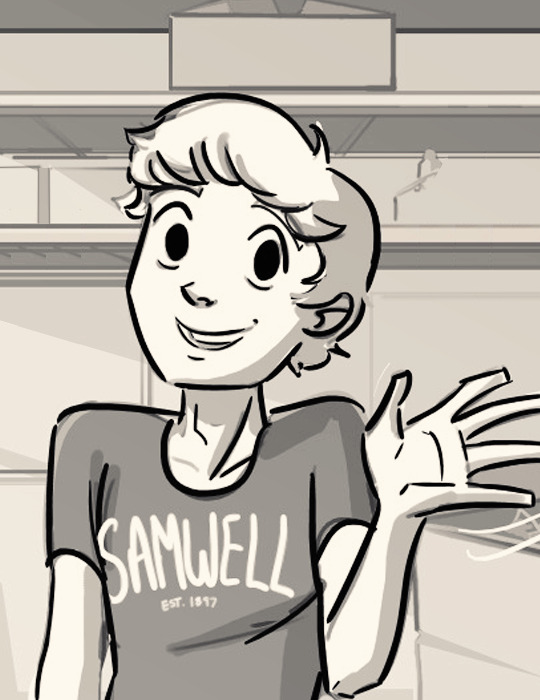
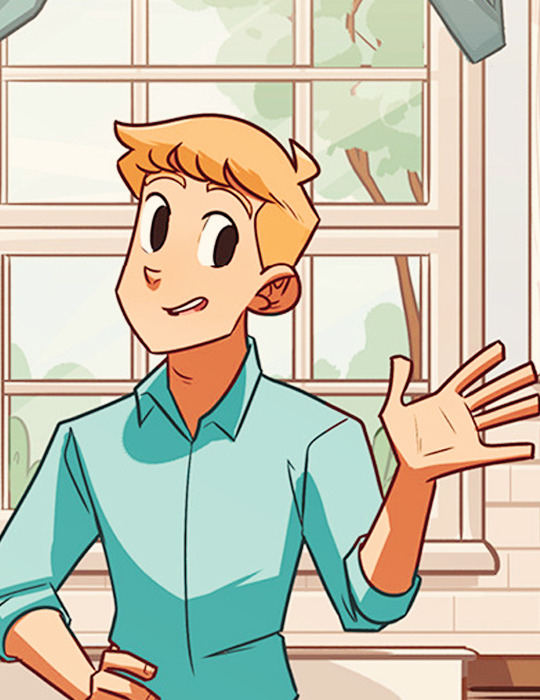
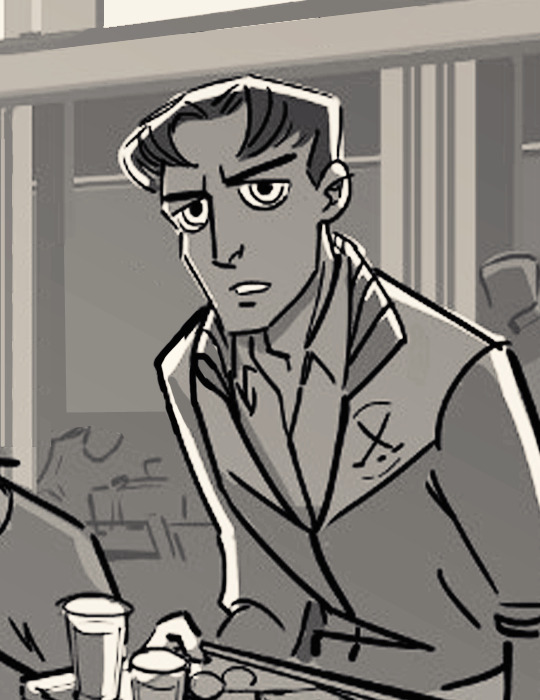
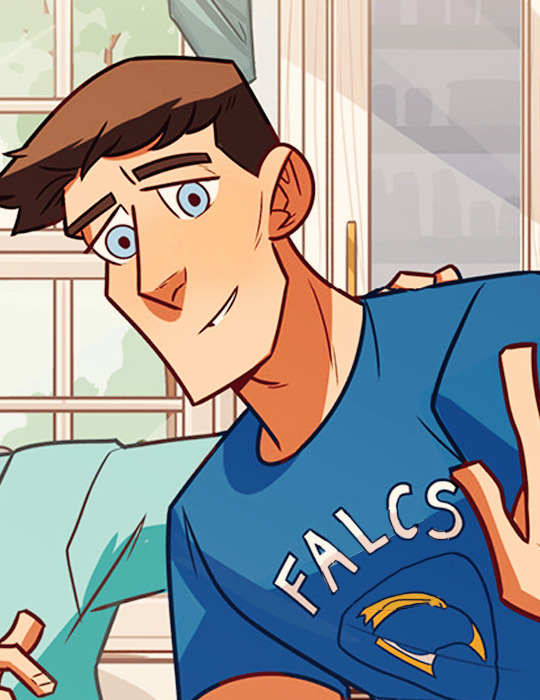
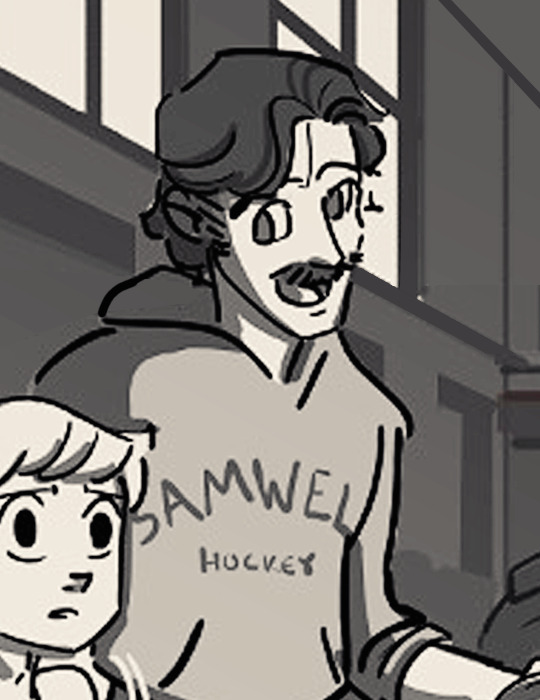
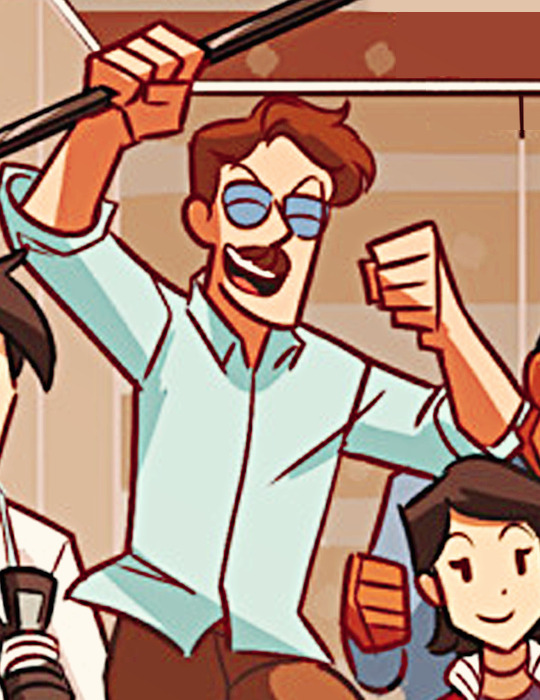
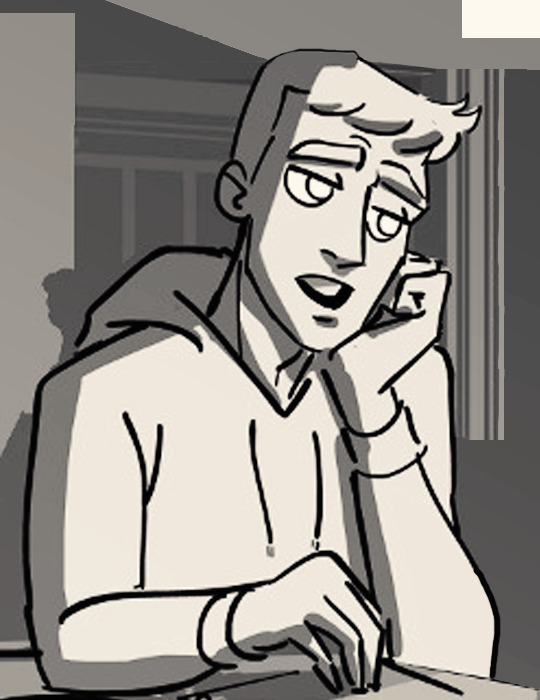



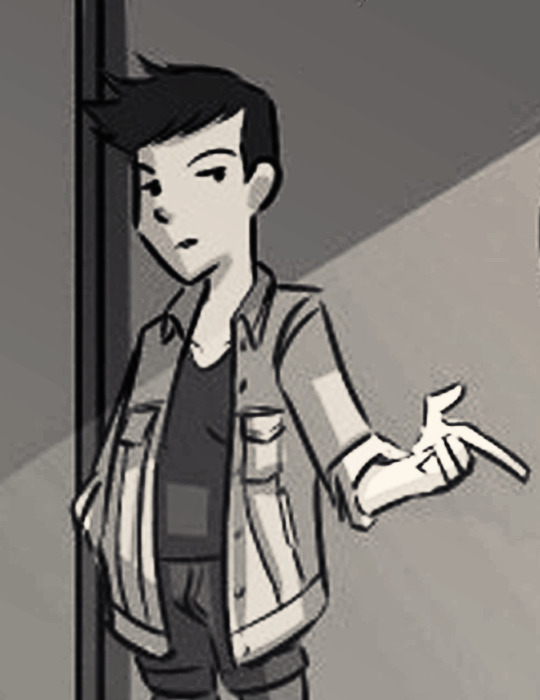
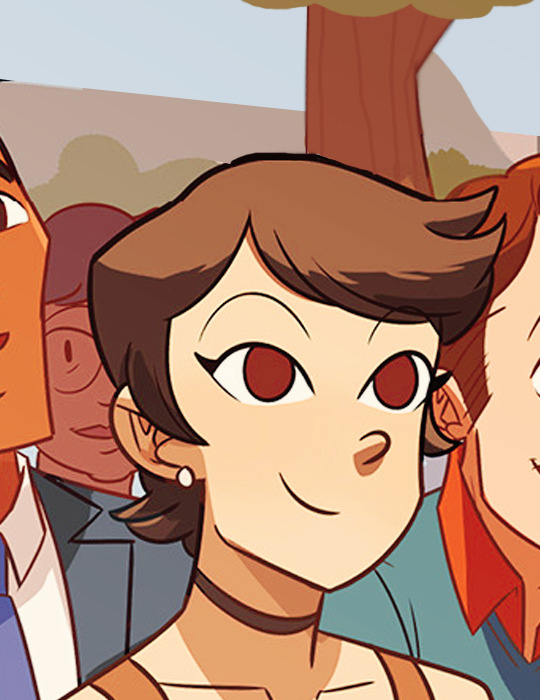
First + Last
#omgcp#omgcheckplease#imma just be here in my corner thinking about growth and friendship and finding yourself as a young adult#heads up: I'm rereading the comic :)#*
2K notes
·
View notes
Text
Unrequited/One-sided Radioapple but it isn't treated like an angsty end of the world thing.
Imagine they slowly get closer after all the banters, and eventually becoming close friends. Lucifer ends up catching feelings for him, and after a long while, decides to confess and ask Alastor if he felt the same.
Alastor admittedly does not feel the same.
He's getting uncomfortable, struggling to keep his composure because he's DONE this before. He KNOWS how this ends. He remembers Vox and all his insistent declarations of affection and desperate pleas for Alastor to reciprocate; the possessive entitlement. He remembers how all those sickly sweet words morphed into something venomous when he didn't give the lowlife what he wanted. He remembers the anger, the ridiculous notion that it was Alastor's fault why he was so mad, that Alastor led him on and that he obviously deserved something in payment for it all-
So yes, Alastor knows how this ends.
It doesn't mean he isn't disappointed though, because he actually LIKES Lucifer, far more than he ever did Vox. Perhaps not in the way the king might have wanted, but he did. He treasured their little talks, their drinking sessions, their shared love for their instruments, Lucifers singing, their little duets, the banter, the playful jabs, the sparring.
He'd even slowly grown accustomed to the other's touches, not feeling the same surge of disgust and discomfort whenever the shorter man would grab at his arm in excitement, forgetting his usual thoughtfulness of Alastor's touch aversion for the short moment of whatever distracted him. Alastor even enjoyed it at times, relaxing at the feel of soft feathers beneath his claws, or the sensation of gentle scratches against his ears.
Difficult as it was to admit, Alastor had grown to care for the angel, the same way he had for Rosie orv Mimzy.
But no matter how fond Alastor was of Lucifer, it didn't change the fact that he didn't feel the same way romantically, or even sexually. No way in the 7 rings of Hell was he going to lie to Lucifer about either, not going to even entertain the idea of pretending he reciprocated for Lucifer's sake. He respected his friend too much for that.
So a clear, direct rejection it is. It was a shame, but nothing could be done. He said his piece concisely, and waited, shoulders set, back straight, smile and eyes a careful blank canvas as he prepared for the inevitable.
Lucifer nodded, a normal soft smile still in place, "Thank you for your answer, it means a lot."
Which......what? Alastor expected an outburst, or at the very least sharp words.
What he did NOT expect was....acceptance? And not just that but, a happy one? Contentment?????
"You're....alright with that?", he had to ask, he had to. Lucifer was clearly just very good at masking his upset.
But the damn angel just smiled?? And it didn't even look fake, just as bright and soft as his normal smiles, albeit a little confused?? Lucifer smiled at him, his brows furrowing in a bit of confused disbelief, as though Alastor is being the weird one here.
"Uhh, yeah??? Why wouldn't I be??? Yeah I may have some feelings for you but its not like you're obligated to feel the same. Above anything else, we're friends first and foremost and i'm alright with that..."
Then he seemed to have reached his own little conclusion as his words trailed off, because suddenly Lucifer's eyes widened in realization of something, and his words picking up with a sense of panicked urgency.
Alastor would really like to know what Lucifer's supposed realization was about himself because he had absolutely no clue.
"I mean, we ARE still friends right?? I don't- I- I hope this doesn't like- change your opinion of me. You're not- oh gosh I'm not making you uncomfortable am I? I- I won't mention it! You can even forget this whole confession ever happened! We can just go on as before! I don't feel any different or would act any different! Honest! I mean, I don't regret confessing because you deserve to know and I'm not ashamed of my feelings, but I don't want you to be uncomfortable! It doesn't change the way i'll treat you! Or change any aspect of our relationship! I don't even think I like you more as a lover than as a friend! I really, really do love our friendship, it matters more to me than any thoughts of being in a romantic relationship with you! So please just forget it all-"
Alastor let the word vomit wash over him, every word leaving him more confused by the minute.
Because yes, there's the desperation he expected, but...it was more about, convincing Alastor to remain friends?? Reassuring Alastor that nothing has to change?? That their friendship is the most important thing here??
(If anyone asks, no Alastor's heart didn't swell. Only lesser beings would have had the urge to cry, and Alastor is anything but.)
Lucifer is unknowingly reassuring Alastor of every single one of his insecurities about the situation. Because Alastor DID want to remain friends, he cared too much about the man to let it go so easily. It was rare to find people who treasure friendships above romantic relationships.
"I don't tend to forget easily, nor will I forget this one in particular.", he spoke, finally finding his voice. At Lucifer's defeated, pained expression( is their friendship really that important to him?), he continued. "But....yes. I'd like that.. To remain...friends."
He didn't often say the word out loud, being comfortable enough with each other that it need not be reassured with the label. But with Lucifer brightening up like his namesake, relief and happiness palpable, Alastor felt no qualms at declaring their friendship out loud.
So life went on as usual. True to his word, Lucifer remained basically the same. The following weeks were a bit stilted for Alastor, as he put some rather painful distance between him and the angel; limiting their interactions, their usual touches.
Anytime now, Lucifer would break and show his true colors, Alastor would think, waiting for the boot to drop. Lucifer would end up angry, and dissatisfied, and that was that.
But it never happened. Lucifer never expressed discomfort when Alastor avoided him, seeming to be understanding of the others need for space. He was just as affectionate as before, though initially a bit held back, as though gauging Alastor's comfort.
Months would pass, and the king never faltered. Their friendship remained strong, if not growing ever closer than before. Alastor found himself even growing more comfortable with the man. Affectionate touches were becoming common, hugs and head pats and cuddles being a welcome thing, with the reassurance that the shorter king would never disrespect his boundaries.
Lucifer seemed genuinely happy about it, despite being clearly told that none of Alastor's actions hinted at anything romantic. In fact, he seemed ecstatic that Alastor was getting more affectionate towards him as a friend. The embarrassment the radio demon felt at having Lucifer basically tear up (no really, he was crying so hard, full on drama sobbing) with joy in front of him was intertwined with the sheer incredulous fondness he felt for the man at that moment.
They were sitting at a couch one night, more than a year passing since that confession. Lucifer was leaning back, resting against the cushions, while Alastor had his head on the smaller one's shoulder, nuzzling at the crook of his neck, legs tucked close to his body. Both had a book in hand, two nearly empty cups of tea on the table in front of them. Every so often, Lucifer would flex his fingers that rested on Alastor's head, running a digit against the other's ear, often prompting the demon to lean into the touch. White wings enveloped the two, blanketing them against the chill of the night.
As Alastor turned the page of his own book, relaxing into the touch of his dearest friend, he wondered how he ever got so lucky in hell.
#this may have gotten away from me lmao#this was supposed to be a rlly short prompt of 'Unrequited love but overbrimming friendship' but instead i typed out this word vomit-#i don't know if im labeling things right here??? this may not look platonic tk others but ig im sort of projecting here#bc i want friendships like this soo badd. i mean this is still platonic right??? this is normal friendship behavior like come onnn#I've been teased about being ace bc of this mindset but i always just go RIGHT this is how friendship works y'all blind😭😭😭#bloopnik writing#bloopnik rambles#radioapple#appleradio#platonic radioapple#platonic relationships#aroace alastor#alastor hazbin hotel#alastor hazbin#hazbin hotel alastor#hazbin alastor#alastor#duckiedeer#unrequited feelings#BUT NOT UNREQUITED LOVE HELL YEA#one sided radiostatic#lucifer morningstar#hazbin hotel#THEY LOVE EACH OTHER SO MUCH AND ITS BEAUTIFUL#queerplatonic#i think#fic#fanfic#radiosilence
546 notes
·
View notes
Text
ok, i cant resist the urge to make a post about it after all, especially since it's related to a post i made prior
one of my favorite moments in trimax is By Far this part in chapter 35
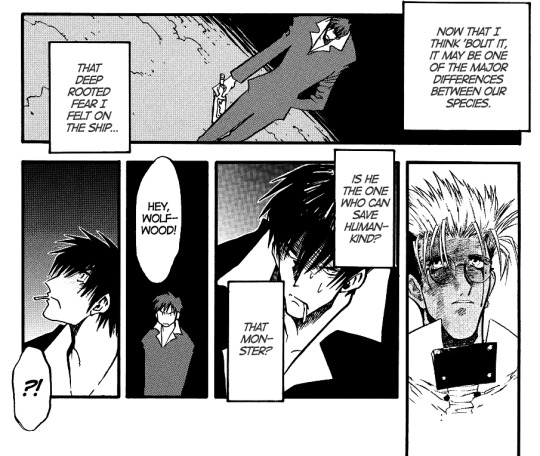
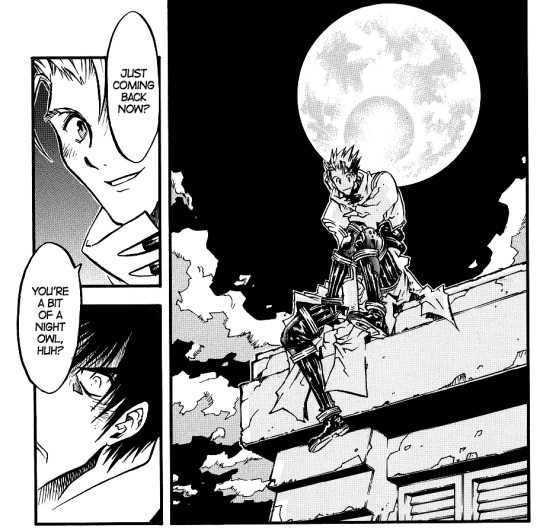
[ID: Two pages from Trigun. The first starts with Wolfwood thinking, "Now that I think 'bout it, it may be one of the major differences between our species." That deep rooted dear I felt on the ship…" He thinks of Vash crying blood and, swearing, wonders, "Is he the one who can save humankind? That monster?" Wolfwood is briefly shown in resolution before someone calls, "Hey, Wolfwood!" and he looks up with surprise.
Vash sits with a smile at the edge of a rooftop, backed by the Fifth Moon and its prominent crater. Vash asks with a smile, "Just coming back now? You're a bit of a night owl, huh?" Wolfwood looks taken aback and wary. End ID]
Right Here. Vash is just sitting there, smiling like normal, but he's got the backdrop of the damage he caused on the moon set Perfectly behind him. it's a glaring reminder to Wolfwood of who exactly he's dealing with here, and that TERRIFIES him.
& the fact that Wolfwood still remembers that moment of crying blood as a moment of true fear. because for all the cheer Vash shows in the average moment, Wolfwood just recently saw him nearly lose control Again (at the Dragon's Nest). the second time he witnessed it, & the third time he would know about.
Vash is a walking atomic bomb with multiple charges. even with how cheerful & kind he is, he's shown Multiple Times that he does not have full control. he is decidedly something different, something Hazardous to humans, and Wolfwood knows this very very painfully.
for all that Wolfwood loves Vash, he is also terrified of him. and at this point in the story, that terror is potent enough to nearly eclipse his affection for Vash.
leading to some of the next most iconic pages:


[ID: The next page starts with Wolfwood standing behind the sitting Vash, his expression hard and the moon bright behind him. Vash seems sad and has one eye open. A close-up focuses on Wolfwood looking down.
Wolfwood thinks, "So easy to pull the trigger. So easy to remove half the problem." Another close-up with bright lighting obscures his face but for one eye. Then Vash turns around curiously and asks, "What's up?" Wolfwood sits behind him and says "Nothin'. Come on. Let's go." Vash seems surprised as Wolfwood scolds, "Don't get yerself tangled up in every little skirmish ya see. It'll be pointless if ya get yerself killed before ya meet him." End ID]
the manga frames it like Vash doesn't know Wolfwood was pointing the gun at him, but I think he did know. he's freakishly perceptive over and over again throughout the story. he HAS to be in order to survive like he has. he'd hear the movement of the gun & sense Wolfwood behind him...
he'd know. i really think he knew.
but he doesn't do anything about it. there is zero fear in his face. he turns to look at Wolfwood curiously, a bit confused, but not afraid. he never once thought that Wolfwood would shoot him. there's full faith and trust there in that moment.
Wolfwood pretends that nothing happened, & Vash lets him. they both move on, not talking about it, because they never talk about Anything of substance like this (not until much, Much later).
overall, it's just such a great example of their relationship's development. Wolfwood's fear & Vash's trust that he won't act on it... it's just. Man.
(EDIT: people have made some good points about how Vash's expression when Wolfwood points the gun at him shows that he probably did know and YEAH that's a good point! & probably why I was so certain he knew lol, I just hadn't realized it myself)
#speculation nation#fanny reads trigun#fanny's trigun analysis#trigun#vashwood#trigun spoilers/#granted a lot of this is personal interpretation. some ppl might assume vash had no clue & like. that'd be a fair assumption#i just think Vash is very very perceptive. and i like to think he knew & just didnt do anything about it#because he never once thought that Wolfwood would actually shoot him#sometimes a friendship can be two buds who sometimes point guns at one another#(read: wolfwood points a gun at vash and Makes vash point a gun at him)#& then they never talk about this Ever <3 very healthy communication between these two for sure#anywyas im still making my way thru the original manga rn in my reread. but here have this moment bc im obsessed with it#might have smth else to talk about too. the geo-plants thing is intriguing me. but i'll make that post later.#EDIT: image descriptions written by princess-of-purple-prose
1K notes
·
View notes
Text
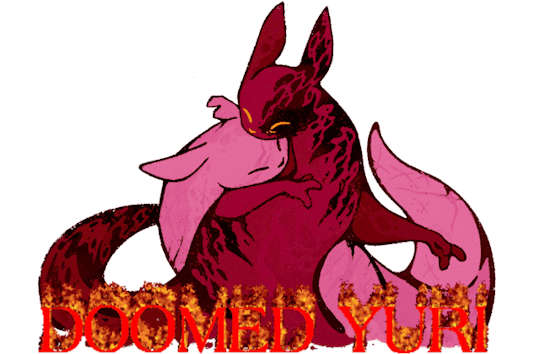
In honor of the @rw-ship-showdown I wanted to write about Artihunter as someone who jokingly slapped them together pre-downpour and still thinks they are actually very compelling. Just not in the super soft love wins kinda way (Although I get why people like that more) And the only way I know how to do that is talking too much so heres a far too long slug essay-
Obviously the slugcats don't offer a ton of characterization but theres not nothing to work with. Their stories, whether by their roles in it or the overarching themes do provide a backbone to work with. Even gameplay itself can provide a bit. (for some more than others) Hunter, to me, is ultimately a story about selflessness. The goal is to revive Moon, which is very much an act of kindness from both Hunter and NSH. But the weight of that action is much more significant for Hunter- Hunter is deeply sick. They're on the clock, and for all their skill in combat none of that will ultimately help them to survive longer than their body can hold out. Moon is a close friend of NSH but that means little Hunter- Hunter really gets next to nothing out of helping them, and ultimately pays quiet a bit spending their limited time alive fighting to deliver that neuron so that someone else can live.
To spend ones limited days on helping another, in a game that very much stresses the unwavering cruelty of the world and nature- is pretty notable. (And you could even say that Hunter being the Hardmode of Rain World adds another layer to this)
And then we have Artificer. A storyline that very much stands out to people as more… villainous (so to speak) than the other slugcats. Artificer's story covers a lot of things. Trauma, violence, revenge, etc. Revenge is a bit of a selfish desire- That need to see someone hurt as they have hurt you. A punishment that ultimately does not fix whatever harm was done- but feels good to see because you were hurt and now those responsible share that pain.
Artificer's actions are founded in that need for revenge, their pups killed for overstepping boundaries they didn't know existed. Is it not fair for them to be angry at that, to punish the scavengers for their violence with their own? Why should the scavengers ever be forgiven when they and their pups were not? And that's how you get that loop- Harm for harm over and over.
The original action has been lost in a spiral of violence for violence. And here stands Artificer- their very spirit scarred. Not just because they sought revenge, but because they never ceased trying to scratch that itch for violence as an answer. Artificer only has two paths for their story- killing the scavenger king (Someone who, really, has little to do with the original 'crime' of the scavengers, but represents an important individual to them- as did the slugpups to Artificer), locking themselves as karma one for good and spending the rest of their life chasing creatures that no longer even fight back in a warped sense of closure- or to dissolve themselves in the acids of the void sea because they're too far gone to find any real peace.
They can't meaningfully recover from that state, not alone, twisting in on themselves. Even if they halt their actions, they've been using violence as a feeble defense against their own pain- violence that no longer has any real direction or basis. Artificer gets no real closure from killing the scavenger king. All they can do is continue the cycle, or try to scrub it away. No real peace in a prison of their own making. So you have a creature, who even with a strict timer on their life- a body that will crumble to disease, spends its last bit of time on saving another. And another who was so caught up in the pain of loss that were eaten alive by their own anger, poisoned their own soul on such a deep level even self-proclaimed gods have no solution for them. What peace can they offer each other? For Hunter, its only a fleeting moment of happiness- of selfish love, before their own body fails them. A bit of indulgence in something for themself. For Artificer, its a single, comforting thread to ground them again, something tangible to protect and care about again. But thats a thread that will ultimately be snapped under the cruel indifference of the world. Hunters timer will tick down regardless of if it takes another with it. Its a tragedy- its doomed to end badly. Whatever good it offers to either of them to find each other will only provide the fleeting comfort of a band-aid that will be ripped away too early. But all that can be worth indulging in anyway, if only for the moment. It doesn't change the ending, but the ending was never going to be happy. Its can so yuri
#rain world#rw shipping#tagging that just cause this is explicitly about that even though I usually dont do shipping stuff#with that said i dont even think this particular interpretation of a possible dynamic needs to be romantic its just kinda#about companionship in general. companionship thats going to absolutely shred an already unstable slug emotionally but thats#the point. friendship and love in spite of the unavoidable ending#just noticed this is like 80% theme analysis and 20% 'these go together just trust me'#but also theyre both girls because i want them to and also because im channeling hornet from hollow knight#who made me so deeply ill that my rain world tags still havent outcompeted my Hk tags because i drew her so much. so so much.#hunter is hornet coded to me and artificer is like if angela and gebura from lc combined into a deeply fucked up ferret#also i did tag the poll because they kinda inspired this but also. i wasnt gonna put all this out here WITHOUT a readmore thats embarassing#but i guess this is propaganda for a ship already seen as popular but like... idk i think theres something to it even as someone#who did literally slap them together originally because they were both red slugcats i considered girls. predownpour so we didnt have anythi#anyway hi tag readers i have so much work to do im being bad by writing about gay slugs. i need to get myself together#its so late this might just be nonsense bwaaaaaaa
672 notes
·
View notes
Text
simply don't have all the brain space to articulate it 100% but that scene in the last episode of mismag 2 where Evan talks about how there isn't a space for him in the world, and that feeling he alludes to that basically suffocates him which says you are not as important as whatever is going on in your friends lives,,, god that's fucking real but also, a thing I've learned over the years: that knowledge that you cannot be the number one priority all the time in your chosen people's lives becomes so much easier to carry when you have people who will put you first some of the time. the people who love you will make time for you. and you'll only realise the difference between the ones who like you and the ones who love you when you realise just how much less you're having to fight to have those people pay attention to you. and it means more when they show up because they're choosing you. and while there will always be work, it's so. much. easier.
#brought to you by someone who chased friendship from people who had one foot out for years and felt lonelier for it#and now has a group of people who love her and don't judge her for her weirdness and whom she makes silly noises with#it took a long time to get here but you carve out that space#just wanna grab evan by his face and go#“it will not remain like this. that is a threat and a promise.”#“you will grow and learn how to be in the world every day”#“and one day you will look back and realise you've become a more realised version of yourself”#“and then - god willing - you'll realise how much you still have left to grow. but hopefully now that journey is exciting to think about”.#sORRY i just keep seeing me in my early 20s in evan and going. fuck#misfits and magic#misfits and magic 2#evan kelmp#dimension 20
64 notes
·
View notes
Text
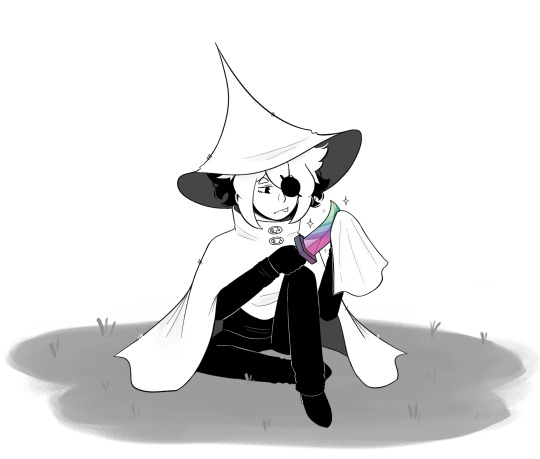
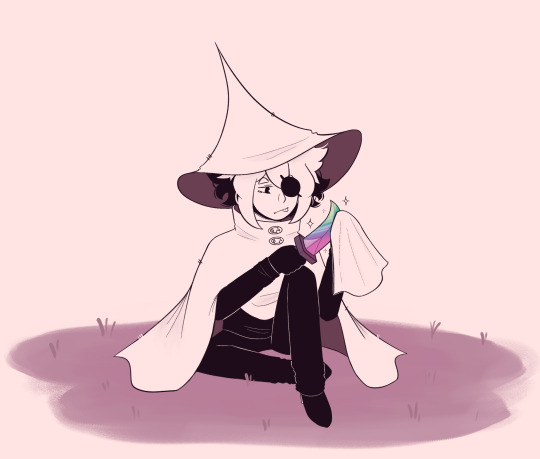
5% of a color headcanon.... two versions since b&w emphasizes the dagger more i think but i still like the warm tones ASFSADA
i am not biased towards rainbow daggers whatsoever i promise (lie)
((also friend is streaming now and im there too!! bit more info linked here, its rated mature tho))
#in stars and time#isat#isat siffrin#i think tumblr is chewing on this ah well#its more of a weapon color headcanon than anything else tbh SAFASDA#but its very funny in my mind to refer to this as#insert percent amount of color headcanon here ASDASFA#i do not have many color headcanons tbh???#overall i would say i have like 1.15(ish) color headcanons that are solid in my brain across the cast???#the rainbow dagger has been in my minds eye for a long time#um SPOILERISH talk ahead in tag talk so be warned#i am serious!! turn back now if u dont want SPOILERS!!!#can u imagine if siffrins parents had lovingly crafted that white cloak and helped him pick out the pure black fit when younger#so they could be fashionably black and white like if things were in color or something#but then the first thing siffrin picks out on their own terms is literally the most colorful thing imaginable for the dagger#i do not know if that makes much sense but yeah#it is fun in my minds eye ASDAFA#actually is it ever mentioned where siffrin got the dagger??#was it also passed down????#ik the cloak was for sure from his family#and the pure black fit underneath is up in the air i think#tho if it was a first pass pick from parents#and he continued to pick it again and again after they got older subconsciously or not might be fun to think about#also do not mind the art style shift it might happen again LMAO#probably sparingly tho? who knows!!!#should i link stream in this post??? i dont know???#i feel a lil bad if it isnt related?????#oh well im doing it anyway because friendship :]#honestly did not think i would also have anything to post today but uh oops sorta just happened and it lined up so ASFASDA#anyway tag talk over stream time WOOO and i think i hit tag limit LMAO
158 notes
·
View notes
Text
okay so i was going to post a poll on peoples' interpretations of taako & sazed's relationship but i went and looked back at the transcript of the chalice episode and i can't even post a poll because i just can't think of enough options that would actually be supported by the text?
its very very clearly a predatory apprenticeship where taako is getting free labor from sazed in exchange for teaching him, and then sazed begins to feel entitled to an equal share, at which point taako shuts him down and speaks to him in actually a pretty cruel way.
taako 'hired' sazed to be a driver and assistant and "general roadie" and i think it's perfectly fine for taako to not want him to be performing as an equal partner, but also, he was clearly taken advantage of. like sazed's proposition is an equal split of both the work and the "glory" and presumably the profit, which is a fair suggestion, but also fair for taako to turn down. but also taako was exploiting sazed's adoration in order to not pay him for his work.
i don't think that equal partnership was something taako ever even let on could be a possibility, he's pretty clear in the conversation he has with sazed that it's not something he's interested in and he "doesn't wanna keep having this conversation." its definitely something sazed really wants, but i don't think it was ever promised to him, it seems like something he's thought of that he's bringing to taako, who immediately shuts it down.
and as unfair as paying for a lot of work with cooking lessons is, it seems like that's what sazed agreed to, and it's also worth acknowledging that even though this is an arrangement i would consider unfair within my own cultural context, it could be considered completely normal and fair in faerun, like similar to a blacksmith's apprentice or something
so i guess the only questions are what sazed agreed to and why, and whether or not taako actually liked him or was just mean to him all the time. idk its all very interesting on its own let alone when compared to taako's later relationships with angus & ren, but not really open to as much interpretation as i’d thought
#mine#taako#sazed#taz#the adventure zone#taz balance#i’ve said it before but i truly have no idea where the exes thing came from. there’s nothing to suggest that. that’s clearly not the dynamic#taako is sazed’s mean boss#which is much more thematically rich anyway#someday. someday i will write the fic about sazed & angus & ren and taako's relationship to teaching#cause like. emotionally wrt to their relationship. keeping in mind the fact that there is not an equal power balance here#i think taako really did like teaching sazed and wanted him to be a beloved apprentice#and sazed really did want taako to be a mentor he was close with and a genuine friend#like they both wanted essentially what taako has w angus & ren later on#but taako hadnt grown past his self-centeredness yet cause he'd just never faced consequences for it#and sazed was too jealous and entitled#so they both had these flaws that soured the relationship and ruined the possibility of genuine friendship#and then of course the murders
98 notes
·
View notes
Text
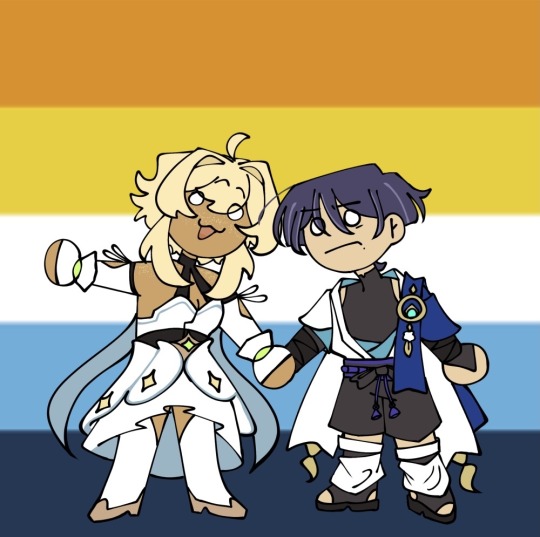
Shoutout to the uh. Three other people who enjoy platonic Traveler/Wanderer. Anyways. This is an excuse to post low quality paper drawings that I did while procrastinating school work.
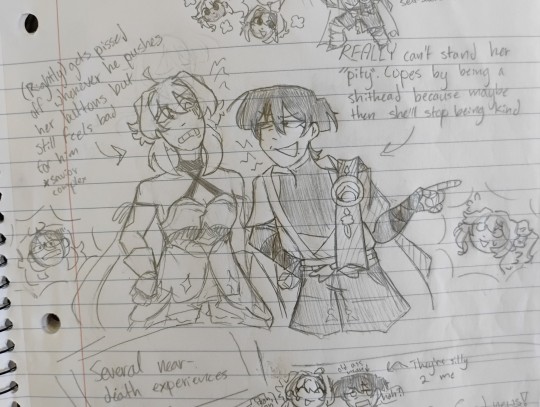
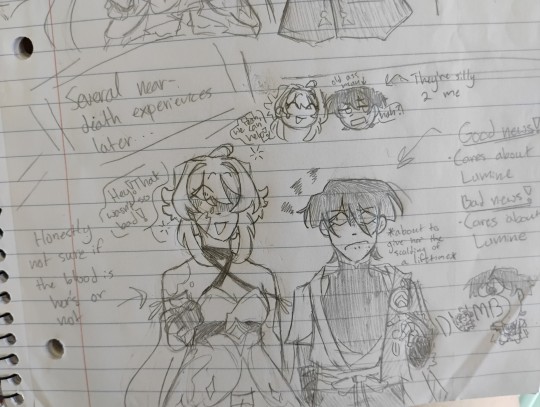
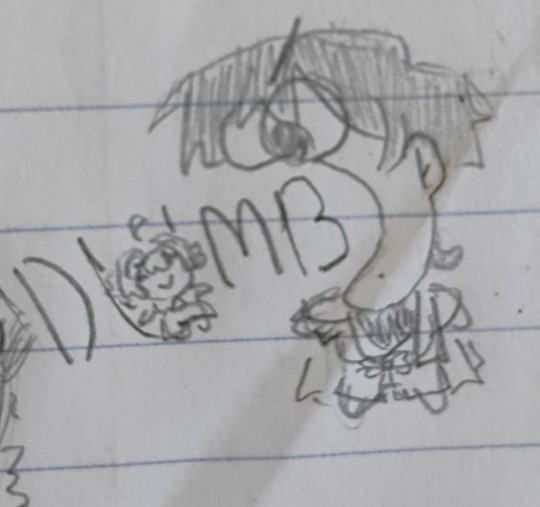
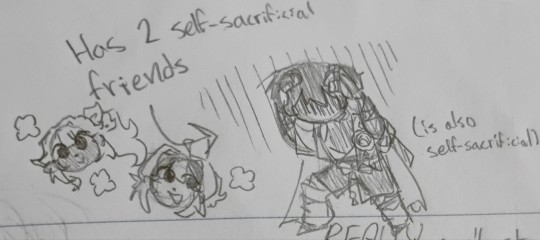
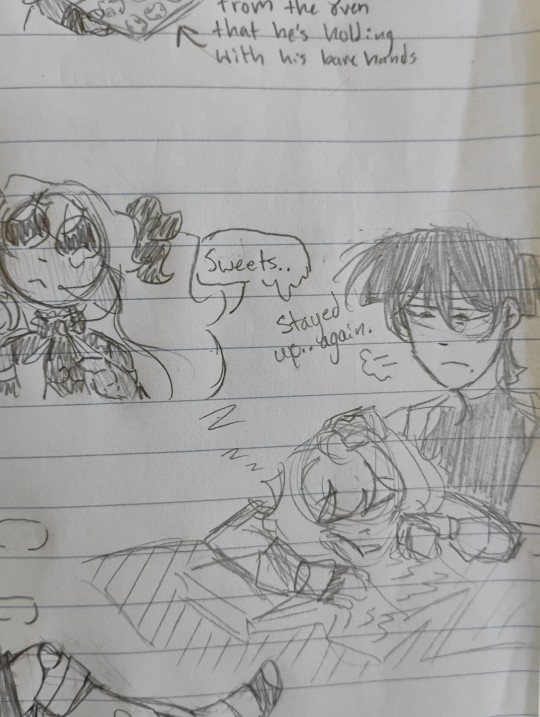
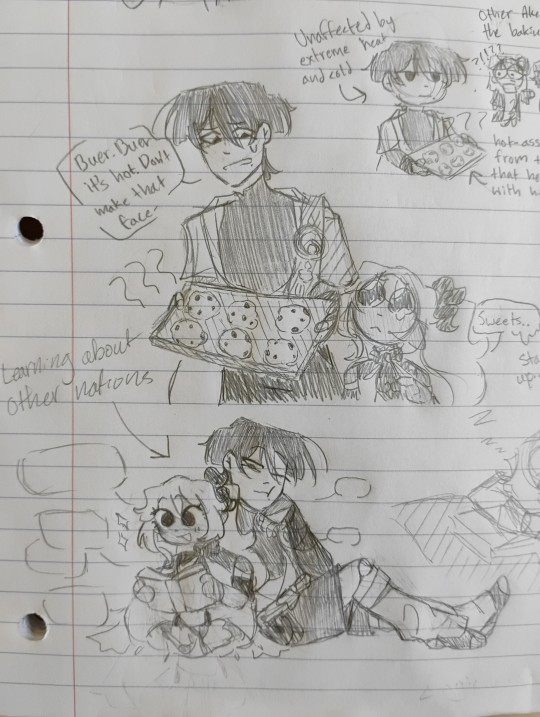
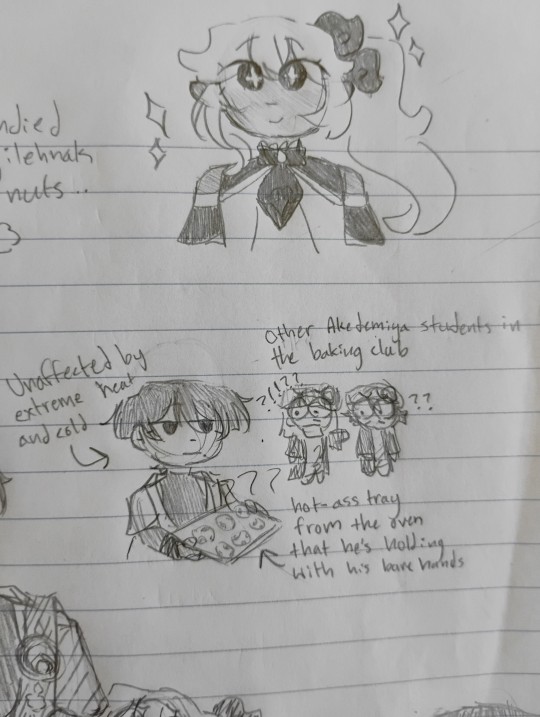
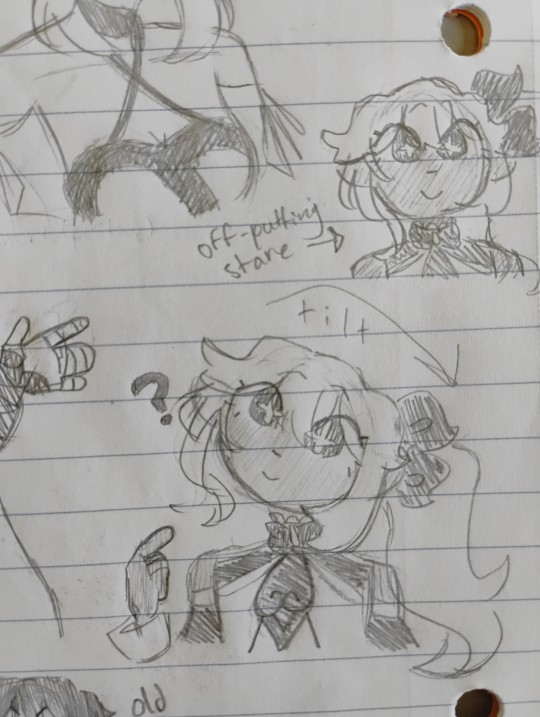
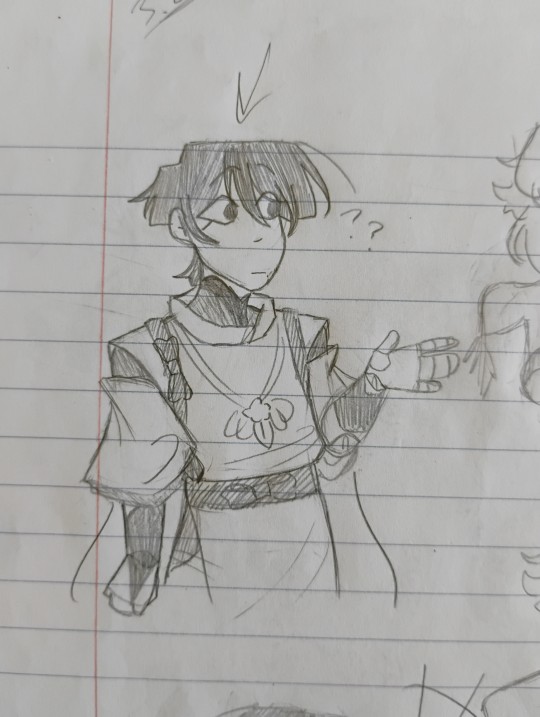
The power of not wanting to do work.. where was this motivation during the summer...
#AROACE LUMINE AND WANDERER REAL. TO ME#i'd just think it'd be. funny.#also getting used to drawing lumine bc I draw her once every blue moon (when we get traveller lore)#but anyways school makes me daydream about my blorbos and I jot down silly ideas#i REALLY want Wanderer grabbing a several hundred degree hot metal plate out of the oven with his bare hands to be canon though#i mean.. we had the furnace with tatarasuna.. so maybe...#idk i find the students at the akedemiya thinking 'hat guy' is human but gradually having that belief shaken#as he does weirder and weirder things funny#wuough. i just need more friendships in the general fandom#it'd be so awesome..#genshin impact#wanderer#nahida#lumine#scaramouche#uhh yeah nahida and wanderer being friends is in here so#immortal friends tag#fig rambling tag
91 notes
·
View notes
Note
This might be a bit of a dark question about the fuzzy AU but.. was Acht alone when they died? I'm assuming timeline wise that side order didn't happen pre Grizz winning (unless it did) so did they spend their last few days(?) alone in the Deepsea Metro with no idea what was happening to them or did something less heart wrenching happen?
Man that is a massive plot hole I completely forgot about and did not see coming. Honestly I think I can make it so somehow Acht already met Callie before getting fuzzed up? Because if not it wouldn’t be so interesting (and most importantly there wouldn’t be enough angsssssst).

Also yeah this post is a bit sad so just sayin’.
Acht and Callie already knew each other and went out together constantly, but they got fuzzed up when they were far from each other. Acht couldn’t get out of wherever they were in, because they were just so weak, until it was too much to handle and they died, alone, nobody knew they were struggling with it.
Callie often gets flashbacks about the time they spent together, however her memory gets blurred by her instincts and she doesn’t seem to be affected by them that much anymore. But she does remember them vividly, being probably their first true love.
She sometimes stays up at night thinking about them.
And the saddest part is that she still thinks they’re doing okay somewhere around.

(Read tags)
#pipebomb#this was a bit hard to answer because I really didn’t want to make it THAT sad so I constantly thought about it and drew it all over again#still this is what happens when I get bored#I’m bored most of my life#angst#art#fanart#my art#original art#splatoon#Splatoon fuzzy au#fuzzy au#Splatoon au#callie splatoon#Splatoon Callie#callie#hope y’all don’t hate me for this I mean I can still draw fuzzy calf1sh being happy so I guess that’s something#me whne people pleasin g#we’ll just a bit cuz this is definitely not pleasing anyone#well*#have I mentioned how much I HATE typing on my tablet before?#oh also I guess acht also had friendships and certain uh like#relationships with others like marina and Pearl and eight n all those. of course not only just Callie#but Callie is more important here since she’s basically the only one they had in that time#like there for them#not relationships as in dating I mean like like like interactions IM THINKING IN SPANISH
133 notes
·
View notes
Text


hi i wanted to draw my own au so have a snippet of scene i rewrote like 12 times and will likely rewrite again
#was thinking about captioning this with uhhh the written version of the scene in my drafts#but its mostly just dialogue#so youre not missing much#i hope i convey the emotion well through expression#sigh part of the reason im hesitant about making this au a comic instead of a fic is that like. most of what ive written for it is prose-#-that doesnt translate that well visually?#a lot of the storytelling for this au i think is told better with narration#so if/when i ever like. share the whole story#it will likely just be a fic#but i suck at sharing unfinished writing on tumblr so what i post here is mostly scenes i wrote turned into comics#<- partially to gauge interest! i like knowing if people care about what im making#but also partially just because i REALLY like this au. its super self indulgent#i know i only draw angsty shit for it but i swear its about friendship ok. like half of what ive written is really sweet#.the other half is actually angst BUT THATS IRRELEVANT. ok normal tags now#doodles#ghost roxas au#roxas#sora#kingdom hearts#hmm i dont think this one translated as well as it couldve. its meant to be a sort of slow build to outright anger#bc its like. soras confusion + frustration finally building to the point hes yelling#but it feels sort of sudden here so idk. could also be that theres no context to this#roxas' reaction too reads a bit differently than i wrote it as (more angry than like. ptsd response for lack of a better descriptor)#WHATEVER WHATEVER DONE RAMBLING IN THE TAGS I HOPE YOU LIKE THE ART
45 notes
·
View notes
Text
sequel to this ramble cause the way james talks bout the reduced cherik scenes throughout the xmen films in this video is making me want to kill people. 'we'll always have paris darling' what if we all blew up.
#xmen#xmen first class#xmen dofp#xmen apocalypse#xmen dark phoenix#cherik#snap chats#im gonna be sick ive rewatched this like five times#IM STILL PISSED AWF AND THEN HEARING HIS COMMENTARY ABOUT IT OUUUUGGHHHH#OOOH WHAT IF I THREW ROCKS#LIKE WHAT THE HELL WAS CUT. aside from that gorgeous 'where are you doing' scene in first class ofc BUT WHAT ELSE#im forced to believe there was a make-up and/or hate sex scene in dofp because wdym they were worried about censorship#LIKE WHAT. WHAT DID THEY CUT. CAUSE CENSORSHIP OVERSEAS IS ONLY FOR EXPLICITLY QUEER THINGS INNIT#maybe paris can be our always i hate it here NO I LOVE HOW THE PARIS BIT IS EVEN /THEIR/ COPE#LIKE PLEAAAAASSE im throwing up. maybe if i draw cherik ill feel better#on the real its genuinely so sad. like even outside of shipping this is still art being reduced#and what we have is still good but the thought that it coudlve been BETTER ...#again their connection is already good from what we have in the final but just ... the lost emphasis of it all if that makes sense#ESPECIALLY outside of first class and dofp- like their relationship really is so sparse in DP and apocalypse its so sad#i think what makes it esp sad is how upset james is about the cut material like its so nice that hes so invested in their relationship too#and its just gotta be so. Excuse Me What when youre told 'hey so your characters cant having a deeper relationship or we're fucked'#'even though the relationship between these two is one of the most fascinating aspects of this generation of xmen films'#is it so hard to want to see like .. even just an intimate 'friendship'. like would it be so bad to see them be so heartfelt#or even just bein a bit silly. or hell ill take them fighting again ANYTHING I BEG YOU the humanity between them is so important#LIKE PLEASE im gonna cope and seethe forever i fear#and when he said 'i thought 'its probably the last time we get to do this to each other'' :((((((((((((((((((((( shoot me#at least we'll always have paris ....
79 notes
·
View notes
Text
i'd like to think that rusalka biology is a little like sharks wherein they kinda regularly shed and can easily regrow their teeth. which brings us to vila who has inherited this trait and just. kinda pops out her teeth every once in a while.
for the longest time she was ashamed of the whole thing and would try and discard the teeth as discreetly as possible but upon getting into rayashki the townsfolk help her shed the negative bias to a point that she sometimes gives them away to the people she really likes (which. pretty much a lot if not all of them) as little trinkets.
which brings us to a situation where one day vila randomly feels a tooth coming loose so she pulls it off and casually offers it to windsong in the middle of the rayashki cafeteria.
in a collective moment to tease the shit outta the two because of whatever thing that's been brewing between them, everyone there acts like vila dropped down to a knee and proposed to her lmfao
#reverse 1999#vila#windsong#certified storm moments#the moment tooth fairy hears of the whole teeth thing do you think she immediately starts to seek her out#tennant windsong friendship after the former scams her and then toof vila friendship because she asked if she can look at her teeth#was going to make the vilasong angle about shark courting behavior but. uh. sharks just start biting the fuck outta their mates so#that's not very safe for work to discuss here. i wrote something about it ages ago though
63 notes
·
View notes